#I mean that as a criticism of the writers and how they frame those feelings not a criticism of Nancy for having complicated feelings yknow?
Explore tagged Tumblr posts
Text
literally, i love nami so much, you do not even understand. you cannot begin to fathom.
#like yes she does fall into *some* misogynistic tropes especially insofar as character design. as much as i wholeheartedly adore arlong#park you could argue that on a doylist level that- when contextualized with a lack of women on the main crew who are actively fighters in#the way male characters get to be- that the fact of(though YES IT IS WELL-WRITTEN ITSELF) the authorial choice to have her empowerment be#gained through asking for help plays into misogynistic tropes regardless of it's technical quality. these criticism are worthwhile.#that said- she is such an interesting & consideratley written character when oda does not fall into those more flawed mindests.#she is amongst very few characters who i have seen genuinely approach wealth as a means of security & stability learned through the absence#of such explored compassionatley & with understanding. she gets to be flawed she gets to be morally gray. she gets to be mean & negativel#-y informed by her trauma & inconsiderate & selfish & at times unkind while also being depicted as human & sympathetic & multi-dimensional#just exist as a fucked up human being doing her best within the context of her universe in a way we rarely get to see with female character#especially in male dominated & male targetted fields like shounen & western comic books. like she is such a salient individual & humana ch#-racter with a holistic & reasoned examination of class-politics & the emotional dependency that can result from the trauma that can#manifest as a result of surviving poverty without condoning it's attitudes OR blaming the victim on a narrative-level is very masterfully#& like something in particular that i enjoy about nami is that she isn't necessarily a good person. she admits as much. but she is living#for herself & what she cares about & that goes DIRECTLY back to a major informing event for her character (bellemere's death & last words)#how she contextualizes her ultimate right to life & consumption. like she is approached as a fully dimensional human beings who- irregardl#-ss of the morality of her conclusions- has context informing her worldview to the extent she is UNDERSTANDABLE without condoning any misgu#-ded views OR (& this is where many writers fuck up) taking them to a severe enough extent that sympathetic framing feels like the impositi#-n of forgivability. & like- the way that itself is done on a techincal level is something i would like to commend oda for in particular.#grey's one piece tag#nami
3 notes
·
View notes
Note
What are your thoughts on those who believe hp fans (fan writers, artists, and appreciators alike) should leave the fandom sphere in favor of not giving JKR any “support” even if one does not share her views, as opposed to consuming fan content (or even the original media) while understanding the separation between art from artist (even if that can’t truly be 100% done, as HP is JKR, though that is another discussion entirely)?
I can only answer for myself, but I guess I would say - I'm a teacher, IRL. And my students, they know about Harry Potter, they know the property, they grew up with the movies, they read Harry Potter fanfiction, and... they talk to me about it. I think it's *good* that they talk to me about it. They ask questions about JKR, about the problematic elements in the books, trans issues, queer villains. Whatever is bothering them, whatever they otherwise feel dumb about asking.
Just the other day I had a very sweet conversation with a trans student who had realized he was gay because Harry and Draco in the books were so "real" and "me coded" (and then he realized people shipped them and was like OH.) Basically, he just needed to be told that his experience was still okay and valid even though JKR is such a terrible transphobe. I had another one ask me "why are all queer people Wolfstar?" (what she meant was, why do gay couples in media tend have a masc one + a femme one. But for her, patient zero is Wolfstar, and that's how she phrased the question.)
On this blog, I'm in this position where I clearly know like, a lot about Harry Potter, I clearly authentically love it (and the fan culture around it...) but am very VERY critical of both JKR as a person, and specific choices she made while writing the books. That's a combination that's definitely got me some hate mail, but also thank-you letters, and extremely earnest questions. And, if I never touched HP meta or fandom, I wouldn't get to occupy that space.
I completely, completely understand people who never want to read the words "Harry Potter" ever again. That was me, for years. I only started writing about Harry Potter on this blog last July, but so far it's been very a interesting, rewarding, cathartic experience. I've also had a great time writing fic, and using that as a means to examine my emotions and issues around this property, and with JKR herself. I got such a kick out of matching JKR's writing style as perfectly as I possibly could, and then writing Book 4 babygay Drarry. Or making Tonks just like, super genderqueer, trans, all of the above. Or flipping the framing to write a 100% canon compliant morally grey Dumbledore, and a sympathetic Lucius Malfoy. People seem to really like the fics too, so that's a nice bonus. I've gotten a lot from fanfiction myself in the past, I think it's a fascinating and useful form of art. So, I like getting getting to continue the cycle.
140 notes
·
View notes
Text
Taiwanese Talk Show The BL Era
Thank you @thisonelikesaliens for shouting out the Taiwanese talk show miniseries The BL Era: Taiwan's Spotlight, it was really well put together and gave me some good insights into the Taiwanese BL market. And thanks @my-rose-tinted-glasses for pointing out Aliens' posts to me when I've been mostly off tumblr.
Aliens has posted about all of the episodes on their tag, which I recommend going through (all of the episodes are linked there).
Here are my main takeaways from all 6 episodes, in case it helps anyone decide if they want to watch/which eps may be of most interest:
Ep1 on Unknown and The On1y One: The discussion about the adaptation choices in both of these shows (as both of these were adapted from danmei) was really interesting, though the lack of discussion about where to end the first season of On1y One was glaring to me. I did like that this episode talked about what made both of these stand out (the build of the feelings between the characters) and how much emphasis this episode put on good writing. There was an offhand comment that Director Liu Kuang Hi made about not needing a shower scene that made me wonder if he regretted that scene in Your Name Engraved Herein (I for one am very glad it was in the film as a critical character moment). That last bit is just me speculating BTW, I don't mean to put words in his mouth.
Ep2 on HIStory 3: Make Our Days Count: It was new information for me that this aired in a time where Taiwanese culture more broadly was interested in tragic stories, I liked having that additional context. Also I was interested to hear confirmed by writers and creators that there was a lot of pressure post-MODC to write only happy endings, though some of the fans interviewed talked about how a sad ending can be acceptable if it's earned. This was such a tumultuous experience for BL fandom, if you didn't experience it in real time I recommend watching this episode to get a sense of the impact.
Ep3 on VBL: This was my favourite episode of the series; it was the most interesting to me because it got into a side of the business I really don't pay a lot of attention to: Fandom management outside of the series itself. I learned a lot about the VBL series including that it was produced in partnership with a Japanese company and that it was the first BL since 2018 to air on TV in Taiwan. I also hadn't realized that this company had worked hard to build fandom around the pairs outside of the show itself, and that was a part of why it was so successful. I had no idea that this set of shows did such a good job managing fan engagement. It was really interesting hearing the network person talk about how they think about the show as just one part of a whole that they are selling, and how managing how it lands and what impact it has and what trends is another part. All of that was fascinating. I also liked hearing the actors talk about what it's like being in a CP. This episode did not hold back that the writing in the VBL series felt shallow and that the actors were green, which I was impressed by--I appreciate creators who acknowledge their own gaps especially when they then talk about wanting to see those improve.
Ep4 on Kiseki: Dear to Me: Placing this right after the VBL episode was smart because they talked about the effect of the fanmeet flop and its subsequent handling failure and the impact on the show, which is given more context from the previous ep. I knew almost nothing about this other than that the pressure on the secondary CP in this show was high, so getting this BTS insight into what happened from fan and industry perspective was fascinating. I did not realize that Taiwanese BL producers experienced expectations formed by Thai fanmeets (which differ from Taiwanese fanmeet styles) from both international fans and from Taiwanese BL fans. The framing of expectation and the question of whether Taiwan should follow the Thai model or just do its own thing but better set expectations in advance is an interesting one.
Ep5 on HIStory 2: I'm so glad HIStory 2 got some attention because it's my favourite season that I rewatch regularly. The news that they had a plan to have an check-in on the family from Right or Wrong hurts my heart; how dare they pain me with this info. That being said, the actor Steven Chiang writing what is essentially fanfic for his own character made me very happy. The idea of the Thai market being a one-stop shop and Taiwan still experimenting with small producers that don't have a production line or 360 business model was very interesting. I also loved the Taiwanese pride in this episode, and the frustration that came through when they were talking about how Taiwan has great IP to adapt too, it's just hard to get it off the ground. It was smart to end on this episode, as a speculation on how Taiwanese BL should move forward in the context of everything above: Its legacy, it's fumbles, the international pressures and the realities of the Taiwanese industry. Also, LIN PEI YU PRODUCING A TAIWANESE GL IN 2025?! GIVE IT TO ME!!!
#the bl era: taiwan's spotlight#bl industry#typed so that i can stop thinking it#the on1y one#unknown the series#history 3: make our days count#kiseki: dear to me#history 2: crossing the line#history 2: right or wrong#sorry for how all over the place and lazily structured this is#hopefully this gives folks some info about what the eps are about so you can watch what interests you#I really liked the whole series
95 notes
·
View notes
Text
I Think Hypmic's Portrayal of Gender Roles is Kinda Refreshing: An Essay A.K.A. I'm Procrastinating on a Weekend Deadline :)
Hypmic's talking points on gender are hamfisted, corny, and melodramatic. "Maybe...we shouldn't have a wage gap," is not the hottest of takes. However, like most things in Hypmic, the writers have a lot more to say about gender and gender roles in the framing of the story itself that's much more nuanced. And honestly? It's kinda refreshing.
It's also something that went way over my head when I first became a Hypmic fan. Sure, I read manga and played Japanese video games--usually translated into English first--but I didn't have enough exposure to hundreds or thousands of pieces of untranslated Japanese media. I'm going to guess that most Hypmic fans don't either, which is totally fine and normal. We all exist within our respective cultural communities wherein we're bombarded with messages constantly telling us how to act, think, and speak. We tend to absorb these messages on subconscious levels and reflect them in the art we create and stories we tell, either by reinforcing them or challenging them. Thus, our stories don't exist in a vacuum, and divorcing stories from their cultural backgrounds can suggest the artist is the original thinker of a larger concept or hide their specific point of criticism. That is, if I wrote a story about a man who chooses to not catch fish, drink beer, and drive a Dodge Ram pick-up truck, we should be aware that I'm not the person who conceptualized the stereotype of dudes who catch fish, drink beer, and drive pick-ups. I wouldn't deserve the credit for dreaming up that exact image, and at the same time, it would be incorrect to read that as me targeting those three things randomly. The choice to not drive a Dodge Ram pick-up is not a commentary on Fiat Chrysler Automobiles. It's a stand-in for the notion of masculinity.
Thing is, we're hit with messages about masculinity, femininity, and other gender-related concepts on a daily basis. No matter where you live or what language you speak, every person on Earth is inundated with messages saying, "This is what you are, and consequently, this is how you should act." Our relation to these messages is complicated, and this complexity is compounded by different cultural communities preaching different messages in their stories, marketing, and human interactions. For instance, the US's massive global cultural influence means that those outside the US can still easily recognize what I mean by catching fish, drinking beer, and driving enormous American pick-up trucks. But the location and cultural differences may add or subtract nuances. A person living in, say, Munich is unlikely to have Dodge pick-ups advertised to them the way a person in rural Texas would. Our fictional Munich person does not feel the same social pressures to buy a Dodge and represent their masculinity with a Dodge the way our imaginary Texan would. In turn, the Munich person likely sees a Dodge with an element of absurdity--who the hell needs such a big truck in a European city?--and foreign Americanness. The Texan wouldn't have that concern--why worry about navigating your enormous truck down narrow streets when you live in the countryside?--and sees Americanness as their local default, thus removing any element of foreignness.
That is to say, gendered messages aimed at people (especially women) who live in Japan don't affect me the same way as they impact those who do live in Japan. Like, it's not my dog in the fight, and there are plenty of people who are directly affected who write their own stories and commentaries on gender roles in Japan. Japanese women don't need a random guy in the US to stand up and say, "Damn, your gender roles are fucked!" 1) They already know. 2) They're already saying it. So I come at this from an angle of someone who already has deep, primary frustration with the gendered messaging in my culture and secondary frustrations when similar messages appear in other cultures. I don't have a bone to pick with Japanese media in particular. Plain and simple, reading and working on hundreds of pieces of Japanese media is what I do for a living. It's in my face constantly, and as a result, I am also perpetually bombarded by messages about gender roles in Japanese media.
It's not a hot take to say that Japanese media, like the media of every single other culture around the globe, has a lot to say about gender. There's a lot of slotting people into boxes and telling people what to do. It's chafing, as we see all across history in art produced in reaction to gender roles. In the past couple of decades, global shifts in gender roles have caused media to shift the messages they're pushing, but it's not controversial to say that Japan has lagged behind other countries like the US.
Many, many stories push arbitrary notions of how to be a girl or how to be a boy that don't necessarily come from the author themselves. The authors probably aren't even fully conscious that they're making these choices. If an author writes a story about a library and makes every female character a romance fan and every male character an action fan, it's likely a reflection of endless messaging that says action is for boys, romance is for girls. In turn, this story becomes yet another reinforcing message. If no fictional girls like action, and no fictional boys like romance, it becomes alienating for real girls and boys who don't follow these same rules. These rules are everywhere and have so much to say about gender that it's hard to know where to begin. Girls must like cute things. Boys can't like sweet food. Women must not express sexual desire. Men can't be shy. On and on and on.
Which is why, when there's a relative lack of this in Hypmic, it's kind of a breath of fresh air.
Wrong Ways to Be a Man
Actually, Hypmic does have a few moments where characters claim there are certain things men or women should do, but the writing always frames these messages as incorrect.
Take Samatoki, for instance. After Kuukou and Sasara leave MCD, Samatoki tells Ichirou, "Men shouldn't cry when they lose their friends. Men should only cry when they lose a family member."
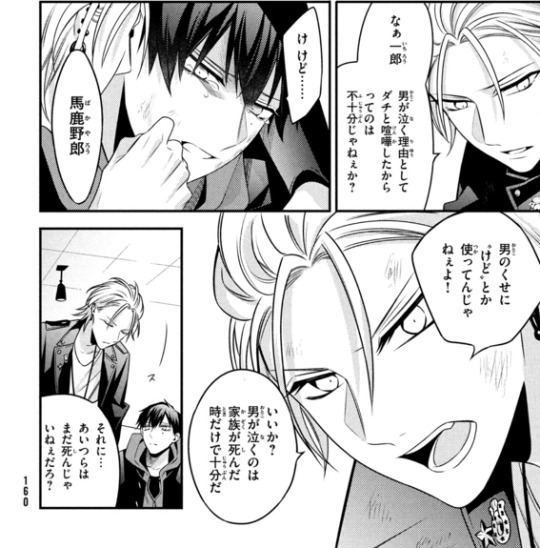
(TDD chapter 10)
This line usually appears via Ichirou's perspective. In the stage play, it's told during a song Ichirou narrates, and as shown above in panel 3, the manga frames the line from the angle at which Ichirou sees it. In such moments, the audience is meant to read this as a cool line from a strong mentor figure to Ichirou. That's how Ichirou sees it, and he's a seventeen-year-old with too much on his shoulders who idolizes Samatoki. He is incapable of seeing how much pain Samatoki struggles with.
However, when the manga focuses on more intimate moments of Samatoki's life, we see that Samatoki does struggle quite a lot.
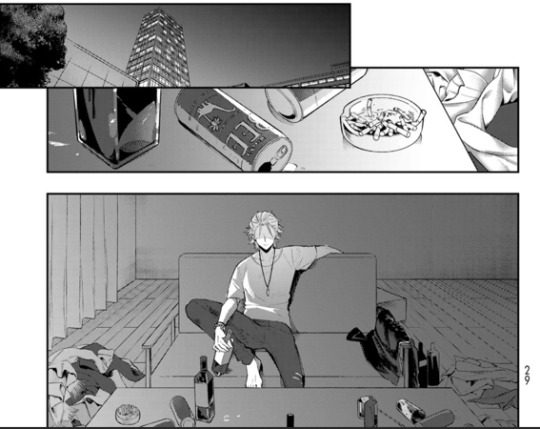
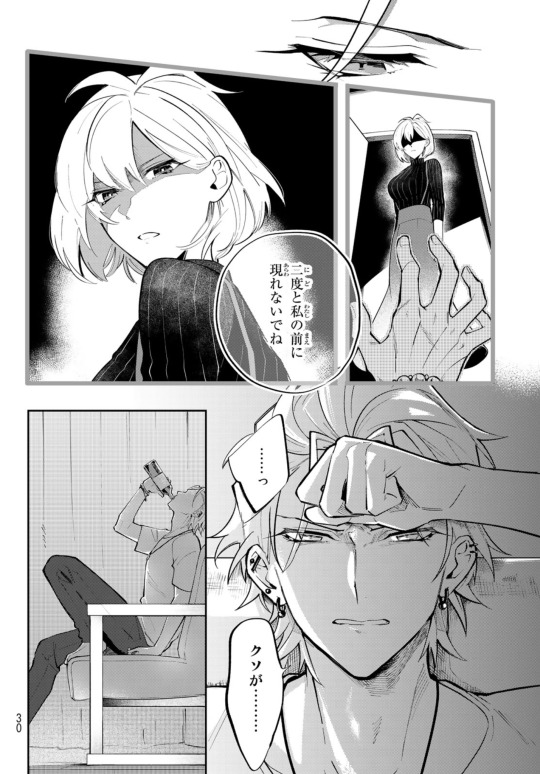
(BB/MTC+ chapter 6)
This isn't a cool, attractive figure meant to be idolized. While Samatoki's cigarette usage and aggressiveness are often framed as sexy or enticing, the juxtaposition with dirty laundry, overflowing ashtrays, and empty bottles make him a sympathetic and struggling figure. Therefore, we should understand that his notion that men don't cry is flawed. It's a means to distract himself from emotions he doesn't want to feel.
Later, as Samatoki begins to process his emotions and open up to his teammates, the unhealthy coping mechanisms recede. Samatoki is more confident, mature, and happier as a result of being more emotionally vulnerable.
We see a similar transformation with Kuukou. As a teen, Kuukou is reluctant to accept help or truly let anyone in. In a conversation with Hitoya, he says (and I am still completely unable to take this seriously), "A man's got to wipe his own ass."
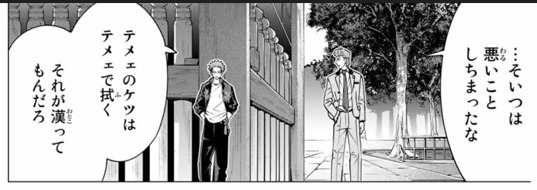
(DH/BAT chapter 4)
However, over the course of his character arc, Kuukou learns that he cannot exist as a good leader or individual without the teamwork of his newfound "family." Only rejecting this classical and toxic notion of masculinity brings Kuukou joy.
In fact, most of the first-line characters have very similar arcs. At the start of the story, Ichirou is insistent on doing everything himself. He has to learn to be able to rely on other people (Kuukou, Samatoki, Ichirou and Jirou) to be happier and unlock his true strength. See below, his final attack and Ability use in the 2nd DRB, which is only possible when his brothers figuratively and literally support him through it.
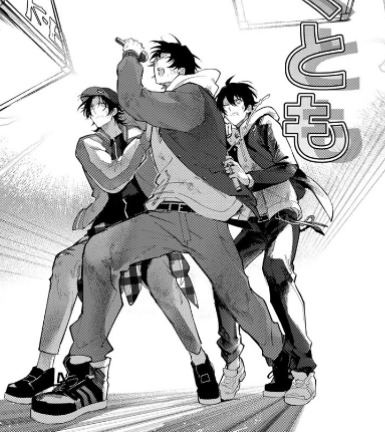
(BB/MTC+ chapter 25)
Sasara struggles with emotional honesty and trust in favor of using humor to gloss over discomfort. It takes multiple heart-to-hearts with Roshou before he can let humor take a backseat and say how he really feels. Ramuda has difficulty trusting other people and being honest with his emotions when faced with stressful scenarios. Only through Fling Posse is he able to open up and ask for help instead of driving people away when the problems are too big for him to face alone. Jakurai struggles to connect with other people, work through and acknowledge his complicated feelings, and not place himself on a pedestal. Through Matenrou, Jakurai is able to ask for help, be more open, and ultimately be less hard on himself.
The second- and third-line characters follow similar arcs, and this repetition creates a core message for Hypmic: Trust and rely other people. Be open with your feelings. There's a wrong way to be a man, and that's to hurt yourself and other people.
Right Ways to Be a Man...Are Infinite!
But with that being said, there is a surprising lack of commentary on how else to be a man. Hypmic as a whole doesn't do much to constrain the male characters in terms of gender roles.
Sure, some characters do fit into more traditionally masculine roles--Ichirou, Samatoki, Riou, etc. The messaging makes it clear that it isn't wrong to play into masculinity provided it doesn't become toxic. (See above.)
Even then, however, these especially masculine characters are associated with less masculine traits that are either portrayed positively or not portrayed as a joke. Riou is an avid cook, but the joke is never that he wears an apron and knows his way around an outdoor kitchen (tee-hee, men don't cook!). It's that he cooks with horrifying ingredients. Samatoki is a fashionista, but the joke is framed as a counterpart to Ichirou's nerdiness.
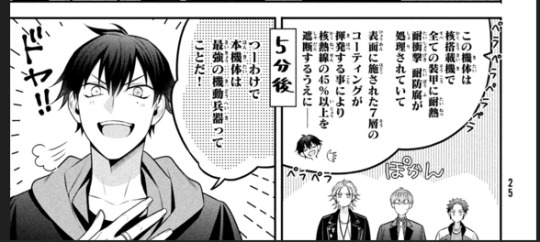
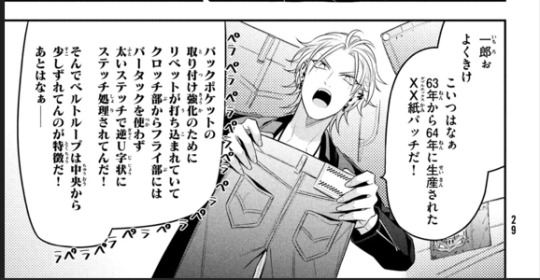
(DoD chapter 1)
Here, it's funny that neither of them can shut up (the ペラペラ/blah blah SFX, the long bubbles filled with lots of text that's cut to indicate they kept going for longer), but the object of their attention--a model toy and a pair of jeans--are treated in the same neutral light. It's very common for stories to touch on, even defensively, the social taboo of men being into clothes. Hypmic doesn't even acknowledge that such a taboo could exist.
This is subtle but extraordinarily effective in giving characters the same consideration and weight. The more feminine characters are always treated just as sincerely (or, if there's a joke to be made, irreverently) as the more masculine characters. Take Ramuda, for instance. In Japanese media, a love of sweets is often characterized as feminine and will often be remarked upon, even in LGBT+ media, as atypical for men. Again, there's zero acknowledgement of such a thing in Hypmic. Whenever other characters talk about Ramuda's food intake, it's always framed as a concern about the lack of nutrition.
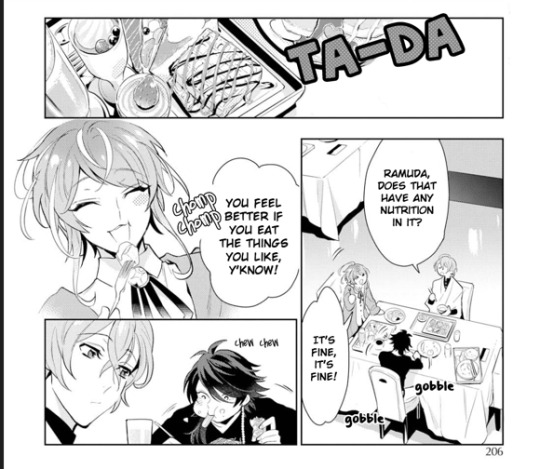
(FP/M chapter 11... I don't have the source lying around on my computer, so here's the old-ass scanlation lol)
It's also given the exact same weight as anyone else's junk food habits. Here, MCD goes out for burgers (a neutral to masculine-coded food due to the meat and high calorie count) while Ramuda opts to try a sugary Starbucks-esque drink. The parallelism in the comic's framing suggests that the two objects are functionally the same, and there is no comment that a sugary drink is feminine and therefore "inappropriate" for Ramuda. There's also no indication that MCD's preferences are in any way better. They simply happen to be the characters' personal preferences. The punchline is two groups splitting up, only to awkwardly run into each other again moments later.
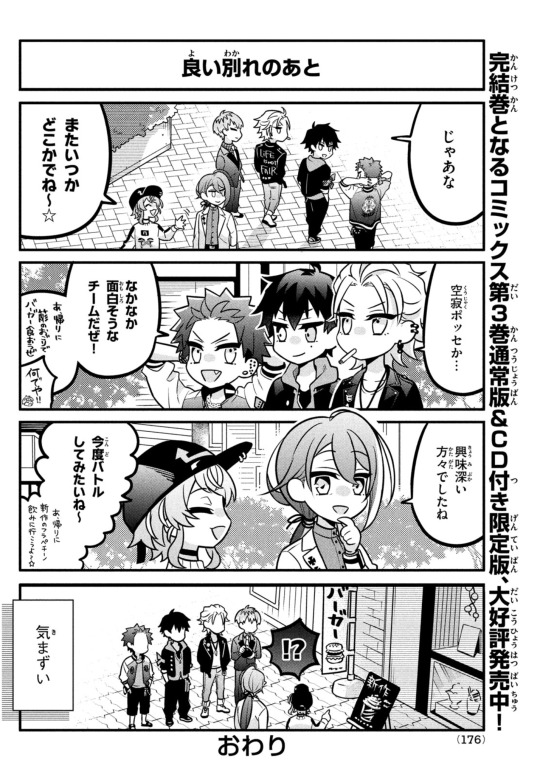
(DoD volume 4 bonus comic)
Similarly, Ramuda's interest in clothes or fashion is never treated negatively--in fact, the discussions of clothes as a means to find identity and happiness make it a positive!
In ARB cards and promotional materials, Ramuda sometimes wears dresses. It's, again, portrayed in parallel to other characters wearing more masculine clothes and is never commented on as something "unusual." It's just who Ramuda is.
Hifumi is another interesting case. Like Ramuda, his playful personality often doesn't as stereotypically masculine. (To be clear, I read much of this as "gender neutral with a strong emphasis on youth" versus "feminine" in a way that I'm not sure has a good US equivalent...metrosexual/yuppie men's fashion, maybe? In the sense that it's a youth subculture that defies some masculine gender roles but is still focused mainly on men. I wish I was more well-versed in Japanese men's fashion and could give an exact term, but I'm what I'm thinking of is definitely an established thing--young, trendy dudes whose styles focus on poppiness vs. the rugged manly man or "idk, I'm just some guy" subcultures. It's a thing that pisses off old Japanese conservative men in the same fashion as people getting up in arms about "the gayz!!!1!" and their androgynous clothing lol.) Their personalities are often the butt of jokes, but only in the same way that Dice or Doppo are--that is, that they're exaggerated and over the top. There's no commentary on masculinity or lack thereof.
There are also moments when Hifumi, Gentarou, or other characters play feminine characters in roleplay moments, which is usually (but not always) not the sole joke. The audience is supposed to find it funny, but the humor is almost always centered on the absurdity of the scene as a whole. For instance, in a moment where Hifumi and Doppo are pretending to be two drunk karaoke-goers, the humor comes from the composite set-up of Hifumi's hair twirl, Doppo's untucked shirt and tie, Doppo and Hifumi's exaggeratedly flirtatious poses, the spotlights and sparkles, and the same font as used on classic karaoke machines.
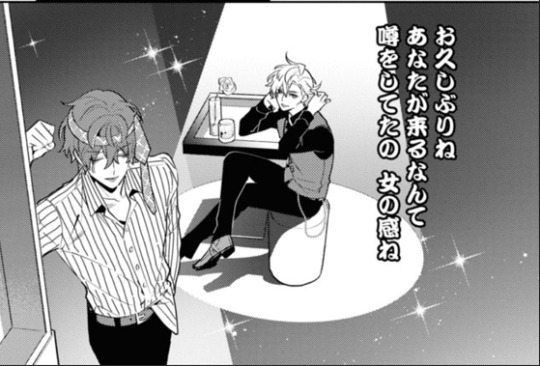
(FP/M+ September 2022 oneshot)
Hifumi and Doppo do not perform traditional gender roles in their homelife, and while it's easy to see and often commented on in the English-speaking fanbase when it comes to Hifumi, I find it just as prevalent on Doppo. It's true that Hifumi is taking a feminine role by doing the majority of the household's cooking and cleaning, but if we were to assume Doppo has the masculine role in the household, he would have the breadwinner duty. However, he isn't the main source of income for their household, and he's just as unassertive in finding a (female) romantic partner as Hifumi is. Japanese men are bombarded with media messages stressing the importance of taking an active role in career and romance. That Doppo does not would, in many stories, make him the butt of a joke for not living up to masculine gender roles. But he isn't; instead, Hypmic portrays him as a sympathetic character. It's tough, Hypmic says, for people to get good jobs and maintain friendships/relationships as an adult.
Similarly, it's noteworthy that Hifumi's self-appointed term "Gigolo" is consistently portrayed as a good thing in Hypmic. The meaning of the English term aside, the Japanese word ジゴロ (jigoro) is almost always used as an insult for a man who is financially dependent on one or multiple women. In the strictest sense of the term, Hifumi is a jigoro in that his income derives from his female clients. However, there is never any shame associated with that, and as a whole, Hifumi's career as a host is shown to be a positive thing. I can't express enough how rare that is in any sort of semi-serious media. Certainly, Hypmic acknowledges that his job requires too much drinking (Doppo's verse in Hoodstar), but the overall portrayal is overwhelmingly positive. Hifumi and his coworkers are never treated as uneducated, boorish, or pathetic for "failing" to find other work that does not require flirting with and entertaining women. (This is partially due to the overlapping judgment with sex work.)
All the various harmless preferences and personality traits of the male characters are treated equally with no judgement over what's masculine or non-masculine. Within the broader context of Japanese media, this absence of judgment stands out and reinforces one of Hypmic's core themes: Differences make us better, not worse. In the end, Hypmic suggests, there's no one right way to be a man.
Right Ways to Be a Woman...Are Just as Infinite!
But what about women? This series is, after all, marketed mainly towards women, and while female audience members can no doubt extrapolate the lessons learned from the male characters, it's worth taking a look at the female characters too.
The female characters do receive much less screen time than the men and are not the focus in the series; I'd argue that's less an issue of overt sexism and more that they fall out of focus in the story the writers want to tell. (There's a broader discussion to be had about inherent sexism in the writers' focus which goes hand-in-hand with rap industries across the globe favoring men and rap being an example of exaggerated masculinity, but that's a topic for another day.)
Even so, the framing of the female characters is interesting in a couple key respects. The individual character arcs and motivations of the main female characters are, in my opinion, some of the weakest parts of Hypmic--many times, Otome and Ichijiku do things because the plot demands them to, making them look incompetent or needlessly cruel for characters we're supposed to sympathize with. Nemu's story seems to be handled with more care and takes an interesting twist, wherein she openly acknowledges that she's disenfranchised as a woman in modern Japan but rejects the notion that she needs to find strength on either Ichirou or Samatoki's (male) terms. By choosing to be strong in "her own way" (whatever that means...it's not well-defined), the authors are using Nemu to reject the notion that strength and power are inherently masculine.
What I find to be far more interesting is the character design for the Chuuouku women, both in what is said and what is not said.
To begin with, the characters and their portrayals run the gambit from highly sexualized to completely non-sexual. Some characters (especially Ichijku and Honobono) have conventionally attractive, curvy body types and are often drawn in ways that highlight their bodies.

(FP/M+ chapter 4)
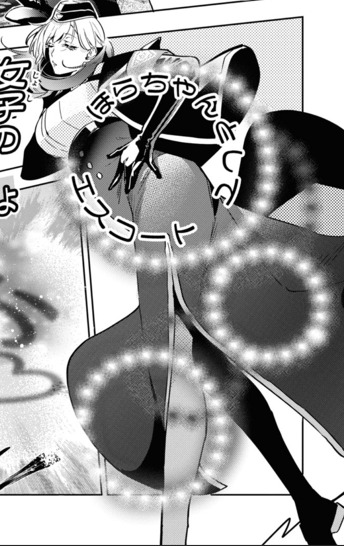
(FP/M+ chapter 14)
In some cases, especially Honobono's, the enticing nature of the illustrations is framed as the character's choice; in the above, her words indicate that she wants to seduce the off-screen listeners. The images included above are largely representative of these characters' raps, regardless of illustrator.
But on the flip side, other characters with large breasts or hips are never drawn in a sexual fashion. By way of comparison, here are two shots of Nemu rapping.
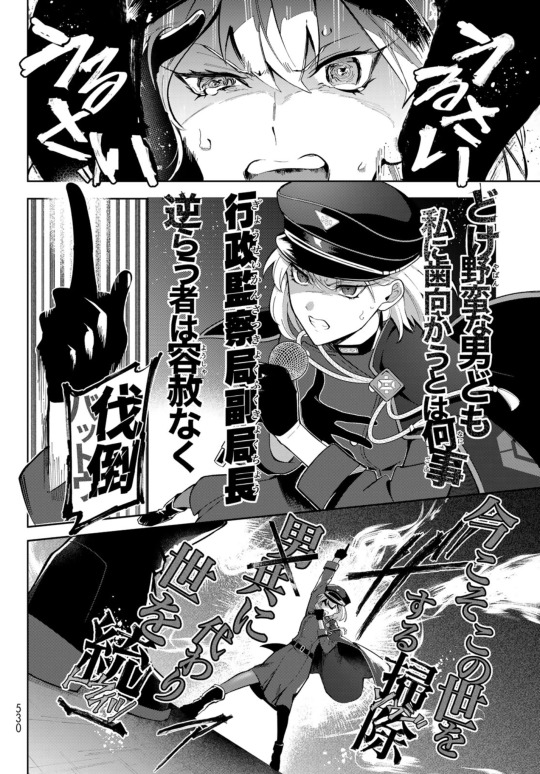
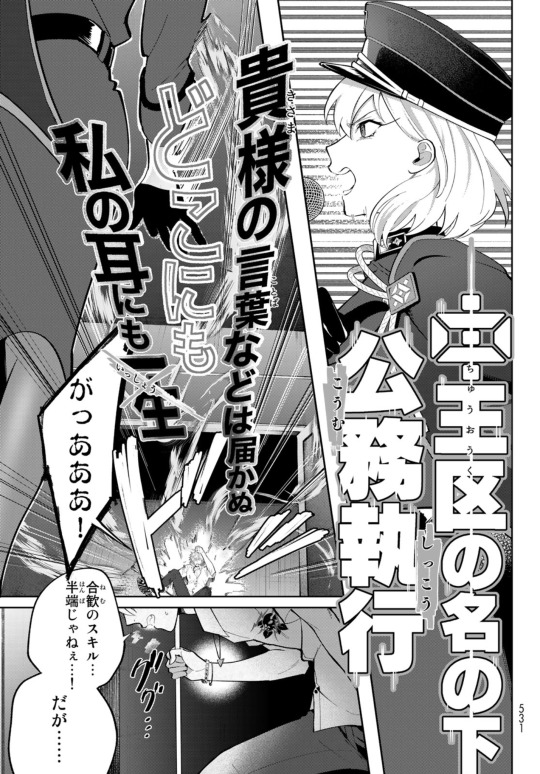
(BB/MTC+ chapter 12)
Even in shots with dynamic poses, no attention is drawn to Nemu's figure in any sort of provocative sense. Nemu touches her chest, drawing the reader's eye there, but the artist does not emphasize the size of her chest--they're allowing a chest touch to be no more than an emphasis of the self. At the same time, Nemu's body isn't downplayed. We can see in panel 2 on page 2 that Nemu has a small waist and wider hips, but once again, she isn't being sexualized. The action lines draw the reader's eye to Samatoki and thus put the action first and foremost. This creates the idea that not only can characters portray themselves sexually, but they can just as easily choose not to.
We see similar with Otome, who does not wear any sort of revealing clothing and is never shown in a sexual fashion. However, Hypmic doesn't equate revealing clothing to sexual portrayals either! While I wouldn't call Tsumabira's outfit revealing, she does have more visible cleavage than most Chuuouku figures. However, her bare chest is never sexualized like Ichijiku's.
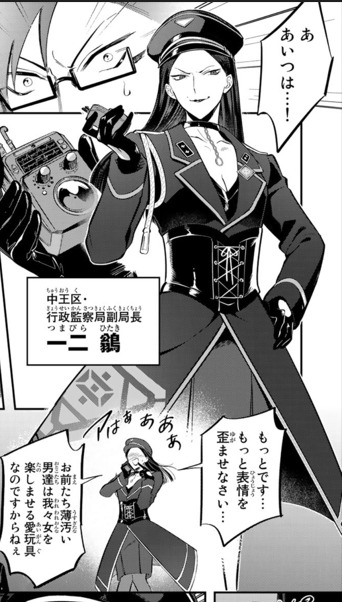
(BB/MTC+ chapter 4)
Compare the non-emphasis on the chest and the power stance to any of the many shots of Ichijuku where her breasts are front and center in the camera. Speaking of power stance, Tsumabira remains confident in her power stance without being sexy--that is, no stepping on the camera and showing her whole leg.
Which isn't to say that Tsumabira is a sexless character. She's drawn visibly turned on by the male characters in such a way that is cartoonish but not, in turn, overly sexual. Were this supposed to be titillating to the reader, I would have expected to see a larger close-up on her face and tongue. However, the artist (who is no stranger to focusing on tongues!) devotes the majority of the panel to Tsumabira's body language (which, again, doesn't absurdly exaggerate any of her proportions or focus on her chest) and covers part of the mouth with text bubbles. Tsumabira is drawn as engaging in sexual behavior without being sexualized for reader entertainment.
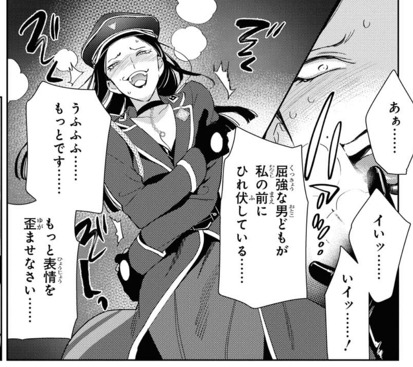
(FP/M+ chapter 4)
The juxtaposition of such different views with little to no judgement attached to any of them suggests that it's perfectly okay to want to be sexy or not, to wear revealing clothing or not, to be involved in sexual situations without being the object of sexual interest, or to simply exist with an attractive body type without sex ever coming into the equation. Just as some characters choose to tie bodies to sexiness, some don't whatsoever--and either is perfectly fine!
The former idea ("I can choose to be sexy") may not sound especially revolutionary to US audiences, where sexuality is thrust upon women willingly or otherwise, but I find it fascinating because it lets the main characters embrace this idea without associated slut shaming. So much of Japanese media insists that women should be sexy but are also wrong for wanting to indulge in their own sexuality. Therefore, having characters who run virtually every iteration of take on the topic (I want to engage in sexuality and be sexualized, I want to engage in sexuality without being sexualized, I don't want to engage in either) with multiple body types (ie, Tsumabira isn't automatically not sexualized because she has a smaller chest; Nemu isn't automatically sexualized because she has a bigger chest) and no judgement involved feels like another breath of fresh air to me.
As a whole, I find the diversity of the Chuuouku uniforms and character appearances quite interesting. They're undeniably all feminine and relatively militaristic, but different characters wear entirely different wardrobes. Skirts vs pants, blouses vs dresses, high heels vs boots... Since every character has her own take on the common theme, it once again feeds into the idea that each character is her own individual and perfectly valid for defining femininity in her own way.
Haircuts, too, range from longer and more feminine hairstyles to pixie cut-esque looks.
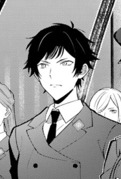
(BB/MTC+ chapter 16)
Again, nothing of the framing suggests this short-haired woman is in any way different from her longer-haired counterparts on the edges of this screenshot.
Finally, while most Chuuouku women are conventionally attractive, I find it extremely compelling that Haebaru is a stereotype of an unattractive Japanese woman. To be extremely clear, I do not think these stereotypes should have weight, but the combination of chubby and/or muscular build, freckles, rounded nose, and non-glossy hair is often used as a visual shorthand for unattractive or otherwise undesirable women.
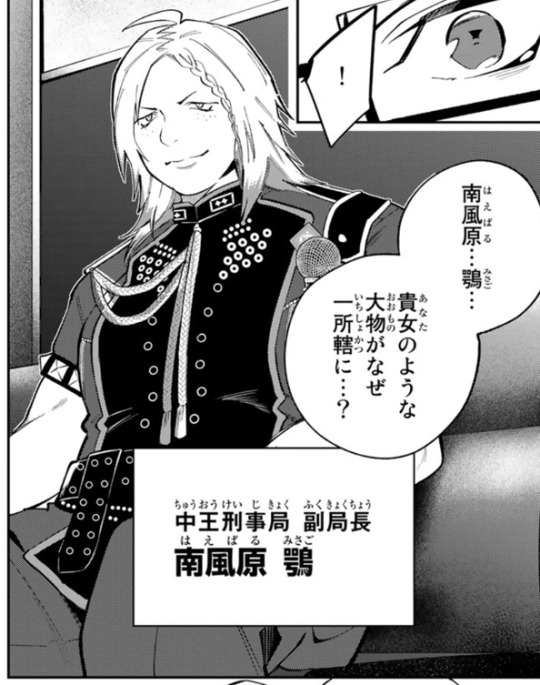
Sure, it's not fantastic that Haebaru is a scheming, two-bit villain. However, so is virtually every other female character in the series, and in particular, Haebaru is (the conventionally attractive) Tsumabira's counterpart. Both are treated with the same respect or lack thereof, suggesting that one's appearance has nothing to do with your ability to be a no-good baddie. Ha ha ha.
It would be lovely if the female characters were fleshed out further and given intelligent choices and diversity outside of the realms of physical appearance. However, I do think the writers' choices are limited by virtue of all women automatically being antagonistic side characters (which, again, is another discussion altogether). What the writers can and have accomplished is further reinforcing a celebration of differences. Just as there's no one right way to be a man, there's an infinite number of ways to be a scheming snake of a woman HAHA.
Intersection with LGBT+ Topics
Unfortunately, this is a very binary look at gender and gender roles, which, while largely representative of the current state of Japanese media, can be disappointing.
Hypmic appears to want to steer shy of LGBT+ topics as a whole, which is a bit of a shame. In a story so focused on gender and acceptance of diversity, it seems the natural next step to explore the notion of those who experiences don't align with a strict gender binary. Such stories are growing in popularity in Japanese media but have yet to be anywhere near the mainstream acceptance in US media (which is still in a fledgling stage at best). I would imagine Hypmic's writers are unable or unwilling to take a definite stance on these topics in the work due to fears of financial or career backlash. If nothing else, the sexuality of the main characters needs to remain in a limbo in order to have plausible deniability for both self-shipping and shipping with other characters. (Some deniability may be more plausible than others.)
The few instances in which Hypmic does wander into this territory are usually clumsy. I am no fan of the handful of scenes where male/male attraction is supposed to be funny purely by virtue of being male/male.
The inclusion of Urumi, the one minor character explicitly LGBT+, is not stellar either. I am hesitant to apply any definite label to her, as the real-life people her stereotype portrays self-identify as everything from trans women to cis men--or refuse to use these English labels at all! Still, we know from her profession (proprietor of a bar heavily implied to be a gay bar by the neighborhood it's in), appearance (poofy permed hair, exaggerated make-up), and demeanor (feminine speech style, a bit flirtatious) that she's AMAB and choosing to present herself in a feminine fashion. By writing Jirou to ask, "Aren't you a man?" in an exasperated fashion, the writers have put her gender presentation in a boke role--suggesting she's over-the-top, exaggerated, comedic. It's not great. I completely understand why readers find it offensive (and it is) even while I don't think the writers intended it that way. Ultimately, it would have been great to see other explicitly LGBT+ characters portrayed without the joking angle.
With that said, I'm not entirely unhappy with her character. She is a stereotype, but the authors have chosen to take only the visual elements of the stereotype and leave the rest on the cutting room floor. In other works of fiction, characters like Urumi are often hypersexual to the point of being in-universe creepy, especially towards underage boys. Other times, characters like her may be eccentric or off-putting in other ways. However, that's not at all the case here. Urumi seems to play a helpful big sister/aunt role in Jirou's life, and he's clearly comfortable enough with her to spend the night at her bar.
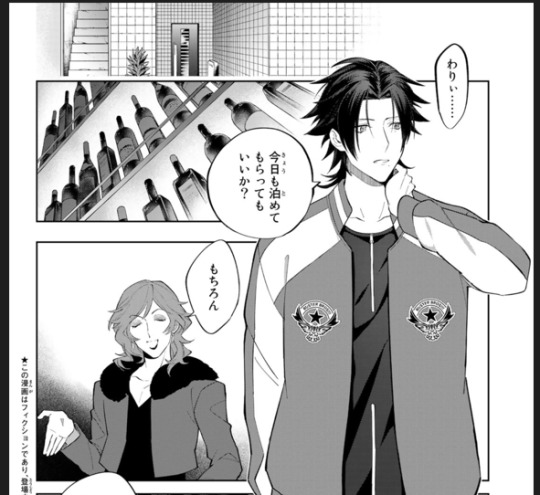
(BB/MTC+ chapter 17. "Sorry, but can I shack up here again tonight?" "Of course you can.")
While she seems to engage in some sort of a bohemian lifestyle, as evidenced by the alcohol and smoking, it isn't anything outside of what many of the other characters do. Additionally, while she isn't drawn in a flattering fashion in scenes where she's playing up her persona (which is par for the course with any character in this series, regardless of gender), there are plenty of neutral shots of her being serious. Finally, the art is never outright rude--that is, she isn't drawn exaggeratedly masculine or flamboyantly...snakey? I don't know how to describe this to anyone who's lucky enough to have never seen this--clearly LGBT+ AMAB characters drawn with noodly limbs and huge, overblown lips winding around male characters.
Maybe because I see so much worse continuing to be produced in this day and age, I feel like Hypmic could have done a much, much worse job with this character. She overall plays a positive role and is treated with much the same care as other side characters. It's unfortunate, then, that the writers have chosen to make her gender presentation the subject of a joke.
In other frustrations, I heavily dislike the unnecessary gender divide in background characters. All punks and other background baddies are male, whereas all adoring fans are female. (But Rhyme Anima has done an interesting job of subverting this!) The vast majority of other background figures fall into strict gender roles, which is likewise disappointing. It appears that diversity may be an accepted trait for none but a lucky few that form the main Hypmic cast.
All in all, I don't think Hypmic's portrayal of gender roles is groundbreaking, nor do I think it's fair to suggest that all Japanese pop culture plays into strict gender roles. There are certainly many Japanese works, popular or otherwise, with much more interesting things to say about gender. However, when compared to the vast majority of the titles that cross my desk on a regular basis, I notice and appreciate the level of care put in to Hypmic's commentary on gender roles. The work consistently reinforces the notion that it's okay to be your own individual, no matter how that plays into your gender, and I find that freeing. That's a message we could all do to hear more often, regardless of culture and language.
TL;DR: Oh no, my rapidly approaching deadline. :)
203 notes
·
View notes
Note
So my friend and I are currently OBSESSED in the eyes of a child it’s so fucking good props to you! But she wanted to know (and not so secretly so do I) if you have read any avatrice fics that you’d recommend for us. We’ve read through nearly all of yours and simply Korra’s stuff but we need something that’ll keep us busy while we wait for your updates! (Bridgeton AU is 20/10 hands down best fic ever just saying)
🥹 First of all, those are "make my whole day" compliments, so thank you so much. Like make me want to cry happy tears compliments.
Second, do I have any Avatrice fic recs? Do I have any Avatrice fic recs!? I think most of my original following were people who liked my fic recs, but I guess I've fallen out of the habit. Must mean it's finally time for me to make a massive fic rec post!
I'm going to start with hidden gems, and move in no particular order through different categories and authors, with the goal of more or less ending with fics that most people seeing this will have read, because they're among the most popular in the fandom. I've read...a LOT of fics, so this is really just scratching the surface, and I probably should make an SMAU section at some point, but this should be enough to get you started.
HIDDEN GEMS
Beyond Our Space and Starlight - so good and creative it should be a novel or TV show or something, but the world fits perfectly for Warrior Nun's cast and themes. Brilliant sci fi, incredible action and emotional depth, and the FLIRTING. A must-read hidden gem of the fandom (since you mentioned SK, you'll find her in the comments section if you look, talking about how incredible this fic is). It's technically AvaBeaLil, but the Lilith side is just tension and feelings through the first seven-chapter arc (which is what's currently published).
Casper (daisychiansandbowties) - a person rather than a fic, they are the best prose writer in the fandom, in my opinion. Their writing is dense, the subjects are diverse, but if you want to get knocked flat by a phrase, read them. Notable fics: chess tournament AU, Alien (1979 film) AU, Interview with a Vampire AU, Pokemon trainer Bea AU, Critical Role AU, 17776 AU, Star Wars video game AU, Napoleonic dragon riders AU. Note that if you absolutely cannot stomach AvaBeaLil, chess, Pokemon and 17776 are your safe bets.
SCP AU - Stormy has a lot of great fics, including tboy Ava, a great AvaLil (unusually with zero Beatrice romance), and a Dragon Age Inquisition AU, but this is the one for me, Ava is a subject at a secret research institute for unexplained phenomena and Beatrice is the researcher who's just been assigned to her.
Summer camp AU - LongWindedAnswer is too well known for this to be as under-read as it is, so I guess it goes here. Ava's got some serious chronic medical issues, they meet at summer camp, and we've got sweet camp hijinks followed by angsty stuff as they grow up with a happy ending.
Post-It Notes AU - I can't believe this has been out as long as it has and is as under-appreciated as it is. Starts funny crack, then turns poignantly beautiful.
ONE SHOTS
Lots of one-shots are hidden gems all their own, and a lot of these authors have written a LOT of them, so check the authors' other works as well! These are just my favorites, or one of my favorites, for each.
Dead mom recipes - a MUST READ, the framing device and the emotional tenor are too good (and jt also does phenomenal ficlets here on Tumblr).
Citadel of Immortal Daylight - reads like the beginning of something bigger, or the middle of it, in the best way. Ava is undead, Beatrice might be a vampire, in a city that hates both.
Dog and cat AU - I'm a sucker for creative premises and I think Sheep absolutely nailed this one (another standout from her is Religion, but she has so so many one shots).
60s small town AU - waitress Ava x photojournalist Bea. One shot is kind of a stretch, this is really a long, deep romance novella.
Wedding artist x wedding musician - omomoification is a guarantee of excellence. Read all their stuff, they have some truly fantastic one shots, including this one.
Blood; Orange - post-canon angst with a happy ending, dealing with the trauma of the Holy War. Collab between MsWitsEnd, Wyper (willowedhepatica), and LongWindedAnswer (whose name got taken off the author list when she temporarily hid her ao3 account). Fantastic piece.
Museum AU - Ava is the curator of program animals, Bea is curator of the Planetarium. Just adorable fluff.
Artist Bea x actress Ava - it's just really good. No spoilers, just read and enjoy.
sunday people - roommates AU where Sundays are for the girls, until Bea starts dating someone who isn't Ava. Jealousy and angst and humor (happy ending of course).
You're My One Regret - Ava is an actress who gives an interview about the one who got away in high school. People figure out she's talking about Beatrice.
MATURE ROMANCE
Leaves of an October Sky - mom!Ava meets married Bea, soulmates but without any of the common soul mates tropes, they just literally get reincarnated and always find each other. This is part of Noel's brilliant Mobius series, which is arguably better read in order, and you really should read them all (chem professors in particular is a classic), but I think this one is my favorite so far.
a little broken, a little new - exes to lovers romance on a road trip. Nothing fancy, just really nice relationship dynamics as they try to work through what went wrong the first time around and forgive.
Call the Midwife AU - 60s midwives AU, tremendous depth and sense of place and time in this one. Lots of tough topics with a nice mature slow burn, and a fantastic early setup.
MOSTLY FLUFF
Timely Suited - demisexual autistic Bea my beloved.
Bookstore x coffee shop AU - Bea works at a bookstore and is roommates with JC, who works at the coffee shop across the street. Beatrice and JC as besties agenda is in full effect. Fluffy and fun.
Coda - ballet dancer Bea x lighting designer Ava (ambulatory wheelchair user Ava too!). Really sweet, plus Adler did some great art for it.
Museum curator - slow burn where Ava is helping Bea with a museum event, but it's really them falling in love.
If You Missed the Mistletoe - autistic coded nerd Bea gets together with her childhood crush, Ava. All fluff.
Hook, Line, and Tinder - pop star Ava goes on Tinder and finds Bea, who thinks she's being catfished. Very fun and cute.
DEADLY ANGST
Liturgia - ongoing at present, incredible music stars AU where more established singer Ava and up and comer Bea fall for each other, but struggle to make things work without damaging the prospects of Beatrice's band. They both have emotional trauma. They hurt each other. It's fantastic.
Failed LDR - Ava and Beatrice broke up when Ava moved away, they meet again at Mary and Shannon's wedding and they're both still broken as hell. Super angsty, really good, still in progress, they're not together but they're in a relatively OK place at the moment.
Frankenstein - Mary Shelley AU, this goes under angst because of chapter 3, chapters 1 and 2 are smut and humor, but chapter 3 alone makes this, for my money, the saddest fic with a happy ending in the fandom. The dialogue and prose are sensational in this as well.
holier than thou - Ava and Beatrice went to boarding school together, and Bea broke Ava's heart (BADLY). The run into each other again years later on the streets of New York. Pretty fluffy by the very end, but it's very angsty for a while.
FANDOM CLASSICS
Would You Be My Wife - not fair to Pinechips to call this a classic because it came out pretty recently, but it became an almost instant classic, one of the most beloved fics in the fandom despite releasing well after the show's cancelation. Fake marriage AU, absolutely brilliant.
Do a Flip - sunsafe's super fluffy slow burn told almost entirely from the POV of Diego as Ava's friend from the orphanage who becomes more or less her kid brother/son, with occasional interludes to show the POVs of other observers. My go-to "feel better" fluff fic and a big inspiration for my decision to make In The Eyes Of A Child from Mira's POV. Technically part of a series (and technically incomplete, even though the story has everything it needs), read it all.
Love Thy Neighbor - first long-form fic I ever read, puppybusby's classic "will they or won't they" slow burn romance where Ava moves in down the hall from Beatrice with the help of her more or less adopted sister Lilith, only Beatrice thinks Ava and Lilith are together. Hijinks ensue.
Art Therapy - Beatrice is an art student, Ava is a model who becomes her muse. Intense, emotional, erotic, a must-read.
Death Doesn't Dream - sled dogs AU, one of the best meditations on grief in the fandom.
Lumberjack Beatrice AU - more or less what it says on the tin. It's really good. It has Beatrice as a sexy lumberjack. Ava moves in next door.
Just to Stop the Thoughts - chem professors AU from the Mobius series. Funny, cute, romantic, fluffy slow burn.
Order for Ava Silva - Bea is a delivery rider who always gets assigned to drop off food for Ava, for some reason.
choose the devil I know (over the heaven I don't) - firefighters AU, all about grief and trauma, very well written.
pull back the curtain for venus - Alien!Bea AU.
The thing about love - college AU where they pass each other in the morning and develop crushes on each other and don't realize they're neighbors who annoy each other through the wall.
Sublime - pro soccer AU. Super slow burn, the confession scene and its immediate aftermath are CLASSIC, absolutely hilarious, some of my favorite writing in the fandom.
The to do list - changed how I thought about confident Bea, big inspiration for how I approached the Practical Guide, Ava makes a list of things that she thinks might turn her on if a woman did them to her and wants Beatrice's help experimenting with her sexuality. Beatrice gets competitive with the hypothetical person who inspired Ava to think she might like women.
Your vows - best use of second person POV in the fandom, professional level framing. Bea is an airline heiress who meets Ava at airports. Trust me.
can i get your house key? - forever roommates AU. Absolutely love this one. Slowburn where they're so clearly in love, but who will make the first move when there's so much to risk? OK, that sounds like a lot of fics, but trust me that this elevates the tropes, and is a classic for a reason.
will you find me (after life) - ghost Ava AU. Beatrice, Lilith, and Camila move into a house that happens to be haunted. Sort of. You'll see. Adorable slow burn.
The trials and tribulations of Snapchat - college AU, fluff and smut and a hint of angst and jealousy where Ava and Beatrice get each other worked up with risque photos.
5 excuses and a confession - 5+1 fic of times Ava finds an excuse to kiss Beatrice and Beatrice can't take the hint. Tagged as fluff, but I think it's actually fairly angsty for most of it. Really, really good.
divine intervention - what if they had sex and acted like they weren't in love with each other and THEN caught feelings? Angsty and smutty, and technically incomplete, but the author got to the love confession so read it.
Lakehouse AU - Ava is finally coming back to visit and get Bea back when everyone goes to Lilith's lake house, except "everyone" includes Beatrice's new girlfriend whom no one told Ava about. Super angsty with a happy ending, absolutely love it.
Mastermind AU - established actress Bea x up and coming actress Ava. A must-read.
in my veins - arguably THE vampire Bea AU, certainly the most popular, and for good reason. Funny, sexy, dangerous, a huge amount of worldbuilding that mostly serves as an obstacle to Avatrice being together as often as they would like. Incomplete at 209,069 words, but they're together, so read it.
Wrong Number AU - Ava texts the wrong number. It's Beatrice. Things get cute.
To climb a tree - the second long-form fic I read. Personal trainer Beatrice tries to help Ava reach her goals for physicality after Ava regains mobility and finishes physical therapy. Very smutty, but also very sweet.
on the run from a losing game - if I was forced to go back and told I could only reach one Avatrice fic but I could pick which one, it would probably be this one. Chefs AU, and it's so, so good.
...is that enough to tide you over?
#warrior nun#avatrice#fan fiction#fic recs#fic recommendations#ask alms#asks answered#alms master fic rec list
34 notes
·
View notes
Note
i honestly think the writers really shot themselves in the foot (as they like to do) with the miraculous timer not existing specifically for adults instead of that just being a skill that has to be trained. The training montage in the beginning of Revelator was cool (in theory bc why is this only a two minute scene) but the fandom‘s main concern seemed to be about how fucked up it actually is bc this is basically forcing kids to grow up too soon. And I see where they‘re coming from, but also the lore for the timer is so unclear overall.
I fully agree. Calling the timer upgrade an "adult" power then giving it to the teen heroes is just weird. Just say that it has to do with experience or emotional maturity or something like that (not that Gabriel was ever emotionally mature, but let's ignore that issue for now). Everyone was anticipating this upgrade being a thing that happened when the characters turned 16 or 18. Having it just randomly show up while most of them are still 14 (15?) raises all kinds of questions and makes people give the upgrade undo weight.
I had another ask about this recently and in that one I talked about how lackluster this upgrade was. The characters don't actually mature, they just kind of will themselves into "adulthood" which is one of my main issues with the complaint you mentioned. A complaint that I have also seen a few times from different sources which is why I feel comfortable addressing it:
the fandom‘s main concern seemed to be about how fucked up it actually is bc this is basically forcing kids to grow up too soon.
It's hard to view the characters' "adult" status as "forcing kids to grow up too soon" when this upgrade is the least serious thing that has happened to most of these characters. Forcing Marinette to try to navigate the complex mess that Gabriel dumped on her lap is "forcing kids to grow up too soon." Luka being banished to Brazil because a terrorist wanted to capture him and force him to betray his friends is "forcing kids to grow up too soon." Adrien having to navigate being an orphan with no forewarning that his father was dying is "forcing kids to grow up too soon." The list goes on.
However, none of those things are why the characters are "adults" now. They're "adults" because of a rather generic pep talk. It's also worth noting that the scenes where the characters becomes "adults" are framed as moments of empowerment. That means that, narratively speaking, this is not supposed to be seen as a bad or concerning thing.
This show's messaging has always been wacky, but I'm pretty sure that this is less a commentary on how messed up these teenagers lives are and more the writers just wanting to show that the characters are growing up because we're six season in and growing up is not some great evil. It's just a normal part of life. That's why my criticism of this upgrade is not "upgrade bad" or "upgrade depressing" it's that this should have been part of a character arc where the characters actually grew up a little!
Also, complaining that the teen characters are "growing up too soon" feels too much in line with people who complain about shows like Miraculous "glorifying child soldiers." It's an action show aimed at young kids. The lead characters are going to be kids and teens because those are the kinds of characters young kids relate to. If you don't like seeing kids and teens being given responsibilities that they shouldn't have in the real world, then don't watch these kinds of shows. To enjoy them, you have to be willing to suspend your disbelief about the age issue and treat the responsibilities these characters have as fine in their world. Or, at least, not concerning because of their age. It's less "this is bad for a 14-year-old" and more "this is a terrible thing for anyone to deal with."
This is why you'll see me do things like treating Nathalie, Felix, Kagami, and Amelie as equally responsible for keeping Adrien in the dark in season five even though Felix and Kagami are "just teens". It's also why I don't really talk about Marinette being "just a 14-year-old girl." I get that defense, but I don't think it fits this genre because, if you're going to use that defense, then why is she responsible for anything? She's too young for everything she's doing! All the teen characters are, but is anyone arguing that they should all quit and be replaced by adults? I don't think so. If we put this stuff in adult hands then we would have a wildly different show.
I do think that the teen characters' age has validity in certain discussion - for example, I think it's perfectly reasonable for them to have teenage struggles because they are teenagers - but generally speaking, I'd avoid using age arguments when it comes to the characters' responsibilities and authority in shows like Miraculous. Characters in these shows are not supposed to be treated like normal teens by the audience. That just doesn't make for a good story.
Along similar lines, I don't like the "this character is only 14" or "it's only been a year in canon" arguments to defend things like the lack of character growth. That's just not a good defense for a fictional story like Miraculous. It's an action-adventure romcom, not literary fiction. It's not supposed to be hyper realistic. It's supposed to be a fun and engaging story. It doesn't matter how old the characters are or how long it's been in canon. What matters is that we're six seasons in and that season five saw the end of the show's first major story arc. By that point, it's perfectly reasonable to look for character growth and satisfying plot progression.
#revelator salt#ml fandom critical#Also worth noting that Luka has been older than LB and CN since the start and yet he wasn't an “adult”#But now he is?#The whole thing is weird#They clearly never thought this through#Forever on my “no one should get infinite uses” hill#You should just get more uses over time#One or unlimited is just silly#Do you call Disney movies bad because they let stories play out in a matter of days or even hours?#Or are you willing to suspend your disbelief and just enjoy the story?#And do you seriously expect the kids who this show is aimed at to get “oh this character is young and it takes time to grow?”#They either look up to these characters or relate to them#So letting the characters grow is actually important for the kids at home as it's how they learn#But the kids who watched the show back in season one have likely learned nothing from miraculous because it's been 10 years#And I doubt it most of them are still watching#Which is why good lessons are so much more important than realism
29 notes
·
View notes
Text
I got a good feeling about "The Acolyte"
Not even kidding. Like, I've spoken before about why I'm wary of it.
George Lucas' Star Wars is something that intentionally has black and white morality, rather than shades of gray. Those movies are meant for kids and projecting a "gray" morality onto them then proclaiming it was George's vision all along is doing so in bad faith.
The narrative of the Prequels doesn't frame the Prequel Jedi in as negative a light as Leslye Headland, Dave Filoni, etc etc do.
See here for more details, but bottom line: yeah, a show that has a darksider as the underdog is bound to demonize the Jedi (who are the actual underdogs in the Prequels), and obviously that rubs me the wrong way.
BUT.
The trailer looks fucking cool. It really really does.
youtube
And more importantly? I've done some research... and Leslye Headland is ticking a lot of good boxes, in my book.
1. The Acolyte won't be a 10-hour movie.
I've criticized Disney Plus shows before, explaining that a big source for most of their issues is that these series are being structured as "long movies" rather than, y'know, actual shows.
But in this interview with Collider, Headland addresses that: it'll be a series. Not a long movie that you need to watch across four weeks.
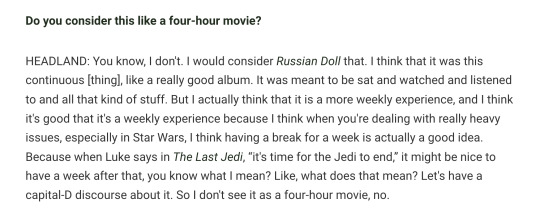
Thank God. You have no idea how much that comforts me. Finally a showrunner who's, y'know, actually running a show.
And this goes hand in hand with what she told IGN, here, about how she's going about building suspense.

Yes! Exactly! That's how it's supposed to be!
Like, compare this to Baylan Skoll's storyline in Ahsoka.
In no possible way was that emotionally-fulfilling. For 8 episodes we had no idea what he was after, and the season ended where we still don't know. What does he want? What is he after? Your guess is as good as mine, it's something Mortis-related.
So yeah. Maybe getting the Emmy-nominated trained screenwriter on board to run this was a good idea.
2. Maybe the Jedi will not be as demonized as I originally thought.
Don't get me wrong. 80% of what she says about the Jedi makes me cringe. It's the typical fan's interpretation and y'all know I disagree with that interpretation.

It's painful to see her refer to the Jedi as an institution (not how the Prequels' narrative frames them) and to see her frame "Balance" in the "oh there's so many of them and just two Sith, that means the Force is out of balance" meaning... but at least she acknowledges the Jedi are a benevolent institution.
They're not an "elitist force hiding in their ivory tower" as others have described the Jedi.
Moreover, there'll be a variety of Jedi POVs, many personalities.
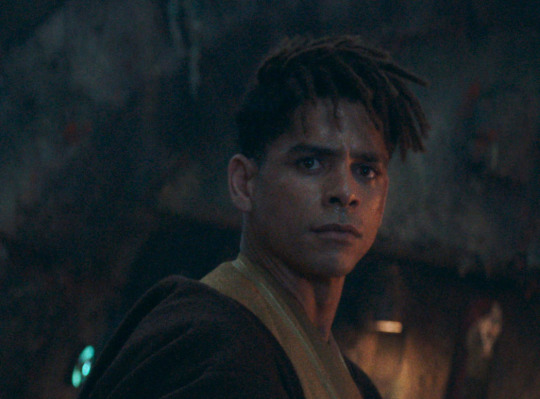
Yord Fandar, is described as a strictly by-the-book Jedi Knight and guardian from the Jedi Temple, is an overachiever and a rule follower.
The question now becomes: will the narrative frame him as "your typical Jedi" or is it just this one guy? I'm hoping it's the latter.
I also like how her reasoning goes re: Jedi drawing their lightsabers.
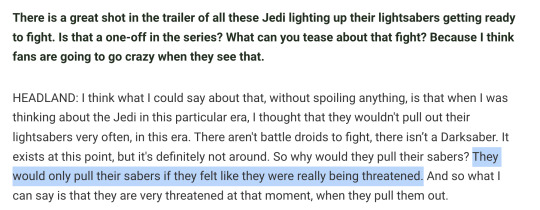
Which explains the hand-to-hand combat seen in the trailer.

This teenager is coming at Carrie-Ann Moss with a dagger, of course the Jedi won't draw her saber.
3. She's a fan of Star Wars... but a screenwriter first.
You can tell in the interviews she's a fan. She's using words like "BBY" and "EU" casually. In the above-linked interviews she's bringing up the Nightsisters, Timothy Zahn, The Clone Wars, she mentions she has a tattoo of Ralph McQuarrie's concept art of Leia, the High Republic books, etc.
She's done her homework. She's a fan.
But the vibe I'm getting from these interviews is that she's weaving in these various lore-elements in a more organic way, rather than in the "fan-servicey" way Dave Filoni has been doing in his shows.
The references and Easter Eggs will be there, but the narrative won't bend over itself just so you can get it. Crafting a good story comes first, and Andor is a beautiful illustration of why this is true.

Which is why I was never bothered about one of the writers never having watched Star Wars before getting the job. You need those fresh eyes when you're tackling something of this scale.
That makes sense to me. Maybe it's because of my own screenwriting experience, but yeah. That out-of-the box perspective is precious.
And like, obviously, that writer watched the films eventually, but for some reason everyone who bitched about Headland omitted that detail and opted for a more bad faith interpretation.
Hm. Wonder why.
Maybe it's the same reason that months ago this clipped audio circulated socials without context, in which she debates whether Star Wars only came from George Lucas and only Lucas is the key.

The FULL context of that interview reveals that she's actually:
debating the "autheur director" myth and positing that it was achieved by a collective of excellent filmmakers and craftspeople that George was skilled and smart enough to recruit...
the studios now think it's a simple as hiring one guy and throwing money at him, because they have no idea what the fuck they're talking about. See Napoleon (2023) for example.
Yes, she also does a jab to the Prequels, which speaks to the generation of fans she's a part of... but overall she's giving Lucas props whilst also stating an ideological difference, that's it!
George is a proponent of the "autheur" theory, Leslye isn't.
However, guess what, in like half the talks George gave post-selling Star Wars? He's giving shoutouts to everyone who helped make the first film, even remembering their names.
So I'm not even sure he'd vehemently disagree with Leslye, in fact they'd prolly have a conversation about it and immediately bitch about how stupid studio executives are :D
But that's not as incendiary, is it? Again, the more I do the research, the more it feels like the reason most of these influencers are hating on her is purely sexist.
I mean, on IGN she's even acknowledging that she does plan on taking stock of fan reactions for Season 2.
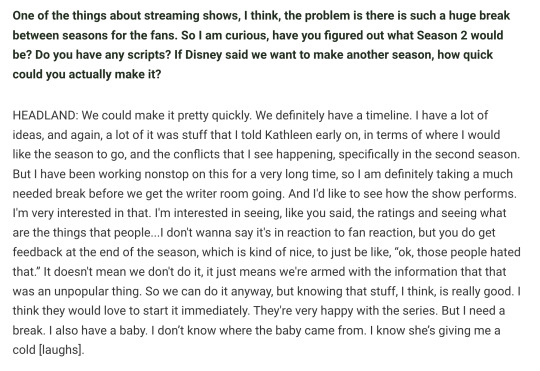
It's not a guarantee that she'll incorporate the feedback, but at least that's more consideration than, say, JJ Abrams or Rian Johnson gave the fandom.
She's even bringing the moral ambiguity that the Gray Jedi-loving edge-lords love so much.
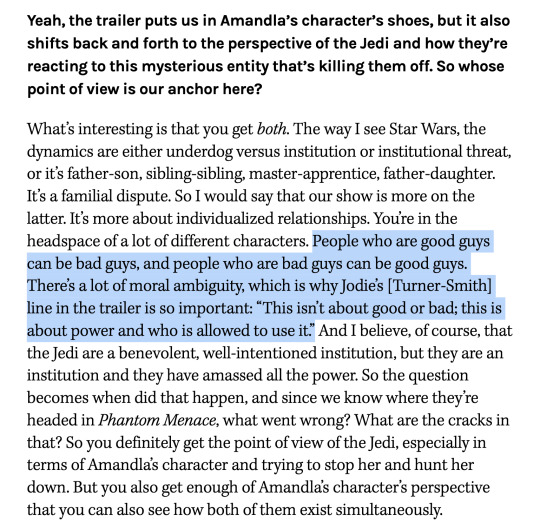
"No, she's a woke feminist! Anything she does is evil! Eww, girls!"
🙄
Needless to say... I'm gonna give it a shot.
I think it's gonna be a good show, I think it's gonna be a solid story.
I'm crossing my fingers that they won't as biased against the Jedi as it seems they'll be. Even if they are... if it's still an enjoyable experience, I'll gloss over it.
As @gffa states in this post:
Worst case? It's not a story from George. I can dismiss it from my headcanon without a moment's hesitation :D
156 notes
·
View notes
Text
sails you are once again my favourite person on this webbed site 🙏🤩
what the st writers don't understand is that nancy suddenly wanting steve back now that he's moved on bc she sees him in a different light now is a million times more compelling than steve still being into her after four seasons of her not giving a shit about him
#also I agree so much with YOUR tags btw????#like I’m very much a fan of Nancy and I get that being thrust into life or death situations with horrors beyond your comprehension means#relationship dramas are significantly less important. and you’re often just looking for safety and connection with someone else who Gets It#but at the same time I really Don’t Like the way Nancy will have feelings for someone else while still in a relationship#I mean that as a criticism of the writers and how they frame those feelings not a criticism of Nancy for having complicated feelings yknow?#I really don’t like how they handled the stancy break up and subsequent jancy in s2 for example#also YEAH I wish they’d think about what works for these characters in terms of their individual arcs and character growth#instead of just being like ‘attractive boy. attractive girl. what if… they kissed… the audience loves romance right…“’#the audience loves GOOD romance that is BELIEVABLE and REWARDING for the characters#unless we’re talking about one of those car-crash toxic relationships in media where we’re invested because it’s So Bad#and that’s not really what stranger things is About?
1K notes
·
View notes
Note
To all the people in the notes of the abortion ask pulling out the obvious... yeah, it's really obvious given what kinks both mpreg and omegaverse are drawing on that most of those stories won't end in abortion. Anon isn't complaining about that. They're complaining about WHY characters don't get or sometimes even consider abortion in those stories. You can have your character consider and then choose not to get an abortion without suggesting that abortion is a terrible, horrible, no-good tragic choice that only ever appeals to either people in desperate circumstances or who are evil harlots. It's the negative framing around abortion that is the issue, not the fact that it doesn't happen - which both doesn't fit the kink and also just tends to be a less satisfying ending to a lot of those stories? Since it cuts off the drama around unintended pregnancy early on, and usually before a lot of the real problems with it kick in.
I'm not as into it as anon but I've read my fair share of mpreg. I usually expect going in that unless it's explicitly outlined in tags, the character is not going to get an abortion. But I know what anon means, there are certain stories that just give me the heebie-jeebies where it feels like the writer WANTS you to believe that it's just the worst possibility so isn't it wonderful that our character didn't go that route. Or of course my heroic good guy wouldn't even THINK about doing something like that!
(Another tell anon didn't mention that someone is influenced by anti-abortion propaganda is when they have a lot of ridiculously inaccurate medical info similar to the myths the anti-choice movement puts forward, like if you have a normal human where the fetus already looks distinctly humanoid at like 5 weeks, or the person is able to tell they're pregnant super duper early, or something like that. Like when the worldbuilding doesn't suggest there's any reason it might be different from normal human pregnancy. I've seen this show up not even in standard mpreg where cis dude gets miraculously pregnant somehow, but stuff where it's a trans male character - there's no reason his body should be able to detect pregnancy any earlier than any other AFAB body!)
It might be worth it for people to read some of the media criticism of how mainstream U.S. media used to come up with all sorts of contrivances to never have a sympathetic female character get an abortion ever, and how that contributed to abortion stigma. You can see with a lot of the famous examples of this (the Juno "fingernails" bullshit is the one I always remember) what it looks like when you have otherwise progressive media unintentionally reinforcing anti-abortion narratives.
I have a friend who is really into mpreg who has "negative or shaming framings of abortion" as a DNW for exchanges because of how common that sort of thing is. (She's trying to figure out the best wording, but so far it's worked at deterring that stuff.)
--
61 notes
·
View notes
Text
Boldly Reading: Watsonian vs. Doylist Reads, Death of the Author and Exploitation
I apparently couldn't help myself. I dunno yet whether I'm gonna keep that in the actual review of Issue 3 on Boldly Reading (where I apparently go into the deepest possible dives on this stuff), but I think it's an interesting enough chunk of writing and meta that I wanted to share it anyway.
Especially if any of you Boosteroos out there have any thoughts on it.
(I didn't get into the queer reading of him here, but I also believe that's another factor that does come into play. Whenever I do the inevitable writeup about that, I'll likely include this, or at least summarize it, but you can bet that it was on my mind as I worked on this.
--
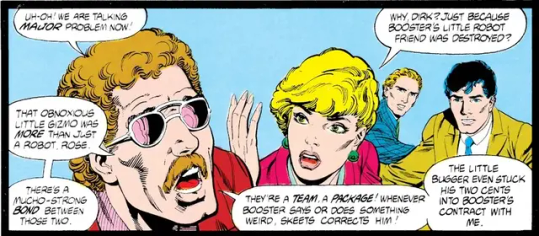
One of the reasons why it’s particularly interesting to view Booster (as a character) through both the Watsonian and Doylist lenses is there’s usually something intriguing about both of those and how they sometimes tie together. Or how what happens in-universe can serve as a commentary on what’s going on outside of it.
Most of the people who would end up reading these reviews of mine — which are some pretty deep dives — already know Booster’s backstory. In its earliest form, it was just: Highly promising college football hero gets greedy and decides to bet on his own games only to end up disgraced. As time went on, though, more and more interesting details got added in, most often by Dan himself, which completely change the framing of that story. The basic facts of it remain the same — Booster getting caught up in a gambling scheme and completely wrecking his own future — but the context and reasoning go from being somewhat simplistic (if unique) at the outset to some frankly brilliant character writing.
And all the more brilliant because of what it says about the creative process, in addition what layers it adds to Booster in-universe, too.
I know that very probably it wasn’t planned out in that fashion from the jump because any creative writer will tell you that stories often end up telling themselves, winging off in directions unexpected. Good characters essentially seem to write themselves. That doesn’t make the writing itself any less amazing, mind; this is still fiction, springing forth from the mind of an author, and therefore the author deserves credit for that excellence. But it does make for a fascinating look into the organic nature of character development, as well as what time can often lend to a story as it passes.
Anyone who knows me knows I’m a merciless critic when it comes to professional writers. I don’t mean cruel (and generally try not to be) and I always believe in giving credit where I feel it’s due (and try to never forget that my opinion is still only an opinion), but I’ve been in this game myself long enough to not lionize anyone. Part of that is because I firmly believe you shouldn’t ever put people on pedestals; that you should always bear in mind that these people are people, no better nor worse than you. That way, when shit like what went down with Neil Gaiman happens, you’re not devastated.
Believe me, I do have a point I’m coming to with this, so you can keep reading to get to it, or you can skip to the rest of the review.
So back on the train — crazy or not — I sometimes try to take into account the author’s life (Doylist) when analyzing the character’s life (Watsonian) because the push-pull influences are neat as hell. Not always, though, because I believe there’s merit in the concept of Death of the Author; that a story’s meaning cannot simply be attributed to only the author, but also to the reader interpreting it.
Walter (owner of the legitimately comprehensive and fantastic Boosterrific) and I have discussed Dan’s writing some and our own individual interpretations, and I’ve even corresponded once with Dan himself, so my own opinion ultimately is that while Dan’s a perfectly fine writer — meaning that he can tell a competent story³, has some good ideas and you’re not likely to find yourself wincing too often — his spark of actual genius really was in the creation of Booster himself, and moreso, specifically in this volume.
In various interviews, Dan doesn’t exactly trash-talk his early work here, but he does make sure to include the caveat of how inexperienced he was and how much better he got over time. And as a writer, I can see that’s true. There’s a definite difference between early Vol. 1 and later Vol. 1. Dan’s skills improve with practice, just like the rest of us.
But again— there’s also a fundamental difference between skill and genius. His skills improved, but his genius — intentional or un — is on display in Booster himself, and how Booster interacts with the world, most evident here early on.
The evidence for this is in how Dan wrote Booster in Vol. 1 versus, say, when he took over the JLA. Dan does a better job in Vol. 1 by about three country miles. How he handles his own creation in JLA is just fundamentally bad at some points (specifically in making Booster a sexist asshole, which he never had been before); it’s almost as if he looked at how Giffen and DeMatteis wrote Booster (and well!) and then latched onto all the exact wrong things, some of which didn’t even exist prior, and pasted them over-top the lovely framework he put together himself, leaving both his writing and his character the poorer for it.
Dan might have been a more practiced and skilled writer in JLA, but I’d argue that — at least in terms of Booster as a character — he wasn’t actually a better one.
So, the point basically is:
(Doylist) Dan displayed real, shining brilliance in his creation of Booster, both initially and with the building revisions to Booster’s backstory.
(Doylist) The revisions of Booster’s backstory from ‘driven by greed’ to ‘desperately poor kid gets a taste of something better than subsistence survival and wants more’ to ‘desperately poor kid in a dire situation bets his entire future in order to save his mother and family and then gets a taste of having money and wants more’ in particular are absolutely fantastic from a character development standpoint PARTICULARLY because they’re doled out over time and actually build on each other. (Dan wasn’t the one who got to the ‘blackmailed by the mob’ part, that was Mark Waid, but that’s the one thing that brings it all together in ways that make me flail my hands.)
(Doylist) Seriously, I could write you at least 10K words on the brilliance of that psychology for storytelling purposes, and it’s made no less good because it probably wasn’t all that intentional.
(Watsonian) This also comes back to what I brought up last issue about the boy having some serious issues about vulnerability. Because once you get to the part where he got tangled up in all this trying to save his mother, in retrospect you realize that Booster himself must have given the harshest possible explanation for his behavior every time it came up prior to that. He had to have intentionally left out the parts of his story that would gain him at least sympathy from whoever was listening to it, which is polar opposite behavior from what one would expect from a young superhero looking to make it big. Booster doesn’t try to give himself a redemption arc. He basically paints himself as a villain. And that’s— incredibly damned interesting.
(Watsonian) The only reason I can see why he would do this, when it’s actually sabotaging him as a heroic figure, is because he can’t stand the idea of anyone knowing something that intimate (and likely sore) about him — meaning that he got on the path to wrecking his life because he was living in poverty and trying to save his mother — because of course they’d use it against him. This is the same dude who didn’t tell anyone his given name for at least several months in canon. Even more intriguing, it doesn’t seem to occur to Booster to invent a less lousy backstory, which is another fascinating twist of psychology. Booster’s a pretty unreliable narrator, but not for any fundamental dishonesty; whenever he lies — at least about big stuff — it seems to be mostly done in self-defense.
(Doylist AND Watsonian) The conclusion is: When you take all of these various factors in, you realize that Booster’s entire story — both backstory and in Vol. 1 here — is a hell of a tale of exploitation. And thus, the sociology (and psychology) in play.
The reason I’m saying all of that is because there are some things which are established as fact: Booster’s really fricken young here. Even in Vol. 1., Dan himself pointed out that Booster’s also pretty naïve, which certainly fits with his characterization, not only here, but also later in JLI. It dovetails neatly with those scenes I loved last issue, where Dirk is being controlling and Booster’s initial response is to try to appease and disarm the situation, and it’s only when pushed well past what most people on better footing would tolerate that he pushes back himself.
It also falls in line with the eighties in general, which was a mercenary time to be alive, at least here in the States. Reagan had dismantled a fair number of social safety nets, trickle-down bullshit was a thing, AIDS was killing people en masse, press secretaries were joking about gay plagues and everyone seemed to mostly be out for themselves.
While you can’t remove from Booster the fact that he was partially complicit in his own exploitation, you can also acknowledge that said exploitation was not only there, but a real thing: Everyone wants a piece of this kid. Everyone wants to figure out how to market him, how to make money off of him, how to manipulate him, and Booster trying to make money off of himself — which is why I said his evolving backstory is so damn genius — doesn’t actually make that any less reprehensible.
Tying it all together…! Thanks to his backstory, we know he was already primed for it, too. Because, as we find out later, everyone’s betting on him, everyone has a stake in this kid, everyone wants a piece of him. Add in that college football is rife with exploitation even today (I should know, I worked right next to a university football locker room and was heavily involved with every game), and young men are beating their bodies (and brains) to hell and back for an education or a shot at the pros, and suddenly, everything about Booster not only makes infinitely more sense, it also makes your heart ache for him.
So many of his experiences as a young adult are about his value to others as something more than as someone. Even, ostensibly, with the people who are nearest to him and should care about him as a person, with the exception of his family in his era, and Skeets and (partially, not totally, as we’ll get into later) Trixie. It’s little wonder he’s such a hot mess, one who has a deeply dysfunctional relationship with his own self-worth.
It doesn’t excuse his bad decisions, or those moments he acts like an ass and I wanna slap him silly, but it does explain them.
So, when you have people on the ground freaking out because his ‘bot got wrecked, not because it’ll hurt him but because it might either raise or ruin his earning potential, the sheer genius of how it all comes together in both the Doylist and Watsonian senses means Dan deserves a standing ovation, whether he intended to earn one or not.
And now back to your (ir)regularly scheduled review.
--
3. Unlike some people. (Tom King, for the uninitiated.)
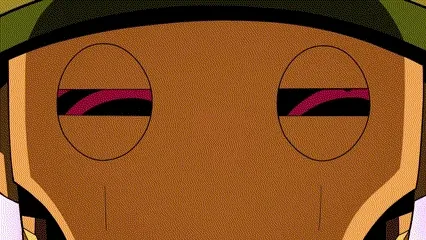
29 notes
·
View notes
Note
Hey I saw your Elita in One posting, and I just want to say that I totally agree abt the misogyny and I was thinking about it as well even before you posted abt it. That movie was actually my introduction to the fandom so I'm fond of it, (I've been a new fan of the franchise itself since last September hehe) but after having seen earthspark, all the live action films, a bit of cyberverse (working on it), reading all of the energon universe/Skybound so far, reading some bits and pieces of IDW1+2, and also having just finished the G1 cartoon (yippee!), the worse that Elita in One comes off to me. Even when it first came out I did not enjoy her character writing, but I assumed it was due to casting/the performance. But really, the fact that it didn't pass the Bechdel Test (a notably simple test to pass) in 2024 is a big part of what is still wrong with the franchise. Elita's arc in Skybound is so...cool! It is so damn cool. And she has so much agency + does NOT change her ideals for Optimus' sake. Even Elita in the G1 episode she was introduced in is characterized as someone who is already a leader in her own right, separate from Optimus for a long period of time. In One it's just so obvious how Elita was not prioritized as a character, and a lot of her character traits reek of "this is what's progressive now right?". It's not like I would expect Elita to be centered in a film abt the origins of Oppy n Megs but I feel like she doesn't get to be "cool" in the same way they and Bee are... 💔 An extended one on one (with actual dialogue) between her and Airachnid would have really helped, but also not framing her violence as humorous and delegitimizing it. I never even noticed that until you brought it up, and I feel like that's a big part of the way she doesn't get to feel as "cool". The pseudo sexually dimorphic design is also pretty frustrating at this point, there was no reason for her to be a motorcycle, and the fact that they tend to make the girls bikes really annoys me. If anyone deserves to be bulky it'd be her! Or at least let her have a builtin machine gun or something lmao. Anyway TL;DR I'm glad you talked abt the misogyny in the film bc it's an example of really subtle misogyny and the tokenization of women, which unfortunately just...does not truly make girls growing up feel included, even if that is theoretically the intent. Actually, thinking about it, it's really wild how the Bumblebee film feels less misogynistic, not just because Charlie is a girl + the protag, but Shatter! Despite her like 7 min of screentime, she gets to be as scary and violent as any other Decepticon + a triple changer! Which is *cool*. Not saying it's perfect of course, but I wish we could have female transformers taken seriously like that all the time
YES 100% THIS, YOU GET IT, ANON!!!
The TF franchise has a history of being super weird about women, but in some of the media you've been checking out that's not the case... and I just really don't want to see any backsliding! I remember a character like Shatter being praised and in continuities like Earthspark, Cyberverse, and IDW2, the gender balance of the casts is handled great. Even Elita-1's intro in G1 with her team, like you say, was surprisingly well-written (I think the fact that Beth Bornstein, the writer, is a woman is evident). When I'm in the middle of watching/reading those I don't even really think about how many women are in those continuities because I just see characters, and that's great. I feel like if there's the beginning of backsliding, fans should point that out.
And I kept really struggling trying to explain my discomfort with the portrayal of women in TF One because when other people have criticized Elita-1's writing in it it's often been because she's too "bossy" or whatever (sometimes people use another word that starts with "B" ;_;) but that isn't what I mean... Elita-1 in Skybound right now is this great, tragic character and is awesome like you say! Elita-1 in IDW started out as a tyrant. And I really love those characters. It's just like you say, it's that Elita isn't treated with the gravity of others, and even though the climax of her story in the movie is this fight with the one other woman character, they don't even say one word to each other....
Skybound and Earthspark are ongoing right now, so I think the contrast was extra clear!
#Elita-1#Elita One#Earthspark Elita-1 may be my favorite design for her so far#Love her alt-mode and it feels like a good update to her G1 version#transformers#maccadam#sexism
17 notes
·
View notes
Note
Responding to your other post...I am so sorry, I did not know that you felt disrespected or insulted when people said those type of things. I mean, of course when people try and actually critize your WRITING ABILITIES, but even though I don't remember making my tone questioning or criticizing when I made that one ask talking about how it was hard to understand your symbolism, I may have also added negativity to the onslaught :(
I swear I never meant it in any way like that at all. When I was talking about my thing, I completely meant it as my own problem. I probably brought it up a few other times even in my ao3 comments, god.. You are an amazing writer, but I'm the one that's not good at picking up some things. I never meant to make it seem like it "was your fault" ever.
You probably don't even know which anon ask I'm talking about, but if I made you anxious in anyway about your writing abilities, please forgive me because I did not mean anything in any harmful way. Honestly I'm pretty sure I meant it in a "Your writing is too good" because I couldn't get some things. I'm also just a little slow so yeah, lol.
it's okay!!! i really didnt want to upset anyone or make them feel like they had to overthink :[ i mostly just wanted to set a line because it felt like people were getting too,,, idk how to describe it. reliant on my input? it felt like people would push me to explain things to them that i purposefully wanted to leave up to interpretation, and in doing so it would kind of destroy the fact that it was meant to have several interpretations + they would act like something not being spelled out was a fault of the way i framed it narratively, even if that was the point. i wasnt directing it at anyone in particular i promise!!
i've been worrying a lot that its my fault somehow for being so quick to engage and overexplain, so i might adjust the way i handle things later down the line. ive always wanted to have a certain degree of distance from my work, where everything is fluid and my word isnt gospel and they can engage with or build off what i put in the text in any way they'd like because art is a living, breathing thing separate from me and that's why i love it so much, and i think i've kind of failed in that regard. i'll probably go out of my way to be more vague about fire at will in particular once it starts getting into the juicy bits. i'll just have to curb my impulse to spell things out.
#ask#i really want to make a real story with my own characters some day because i would love people to go full detective and pick apart details#its what i yearned for in cc and i got it so scarcely .... which caused me to start shouting about things like parallels myself-#-because i was a little too proud. and now i feel like i killed that enthusiasm before it could even start#or maybe im overthinking it. i shouldnt have to think about Fostering A Community im an small fish in a big pond#i might just being entitled. regardless. ive been intensely self-critical for the past bit#im going to give 70 i just want to politely ask for 30#ive been really worried people are secretly judging me and its been getting intense lately#ive been more bold because i turned off the ability to see my follower count but GOD does it haunt me#repeatedly ive been noticing an absence of a lot of people who used to engage with me a lot too and its not making me feel better#i miss you :( did i do something wrong. im sorry
13 notes
·
View notes
Text
The thing I keep coming back to, now that I've wrapped up the first part of "Batgirl, Repentant" and am starting to outline the second, is how much the book's hyper-focus on Steph hamstrings the story I think they're trying to tell.
I say I think because obviously I can't read the writers' minds so for all I know they taped the random lip service about hope and justice and fighting for the little guys onto the Stephanie-love-fest in a half-assed response to criticism, but I'm trying to give them the benefit of the doubt and believe that when the first arc ends with:
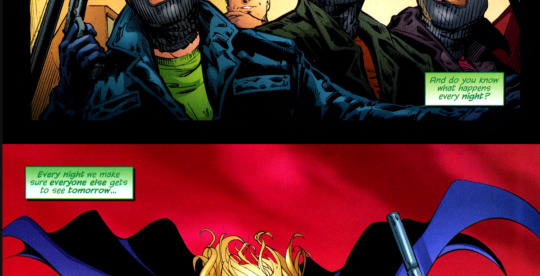
And that gets followed up two issues later with Steph telling Damian:
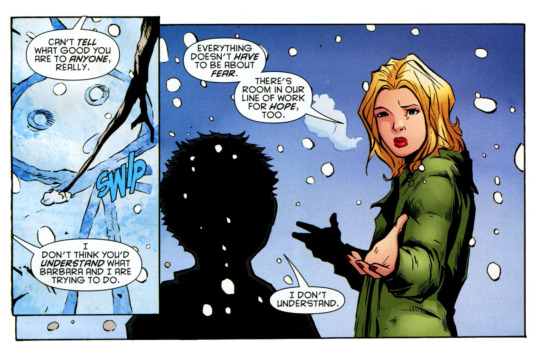
I want to take them at their word that that's what they're going for. But it's not the story they tell at all because, for all the lip service paid, there's not a single plot point that actually backs those themes up. Every single narrative element is instead 100% oriented around Stephanie, her feelings, her desires, and her ambitions, none of which involve helping or protecting other people.
Batgirl's first appearance in issue 1 isn't about bringing hope or protecting anybody, it's about, "Ooooh, who is this mysterious new Batgirl who's such a badass but looked down on by The Man for being a little chaotic? Ta-da, it's Stephanie Brown!!"
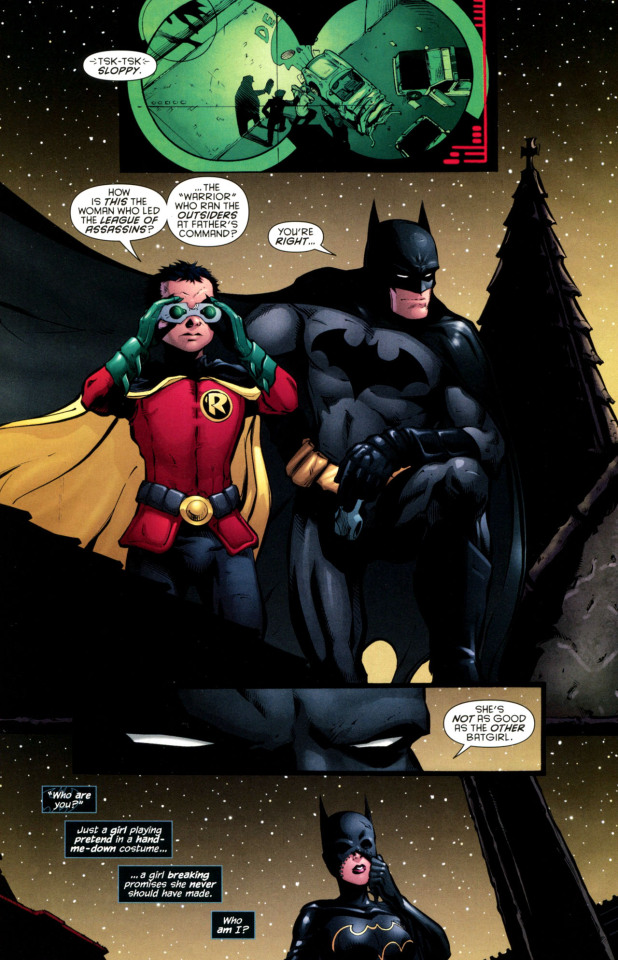
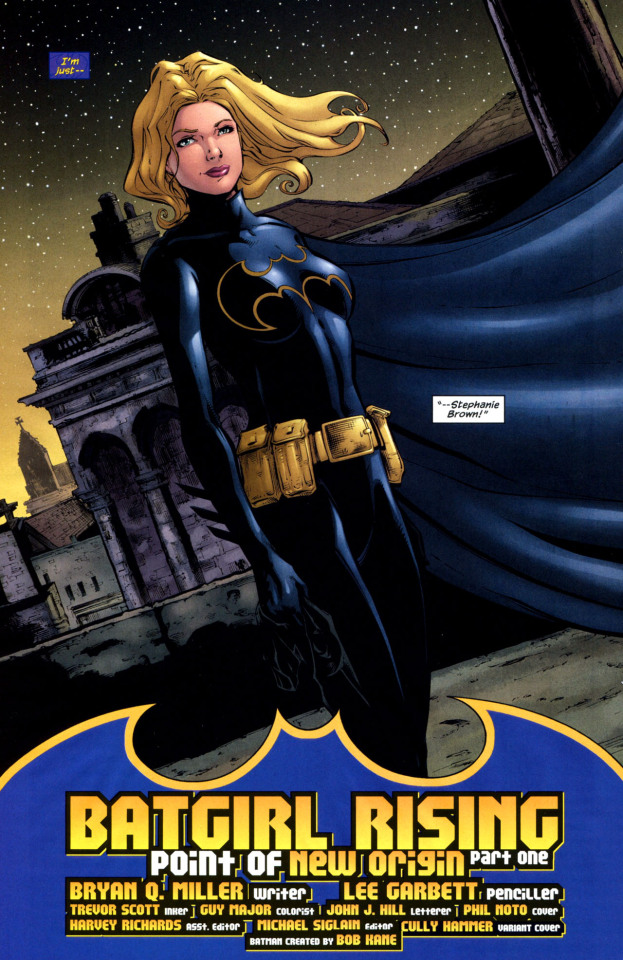
When she talks about promises being made to her mom (by which of course I mean lies, she's just lying to her mother) or the supposed "promise" she didn't actually make to Tim Drake, it's all framed as unreasonable expectations that other people are piling onto Steph's shoulders, without so much as a second thought for how the person she supposedly made these promises to might feel.
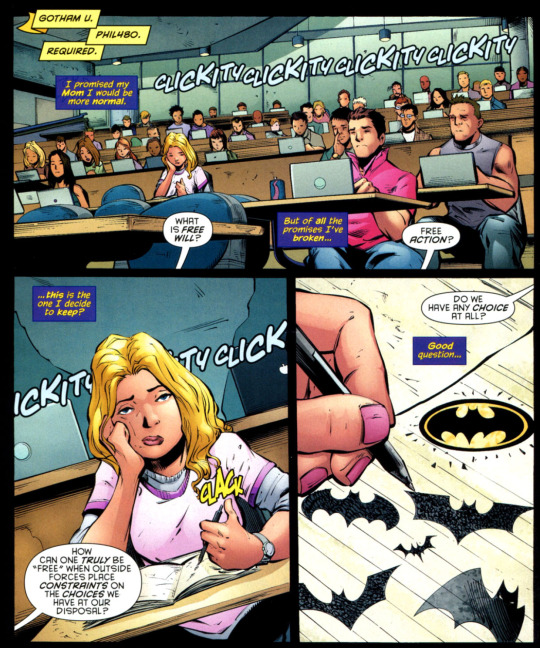
When Cass leaves her the Batgirl costume, it's not with requests to carry on the legacy or protect Gotham in her absence or even to look out for Barbara, it's all about Cass's relationship with Bruce (as though that was ever her motivation!) and then "Now the fight is yours, Stephanie" while she vanishes into the rain in her underwear. Like Batgirl is a toy she's letting Steph have her fair turn with now that she doesn't want to play anymore.
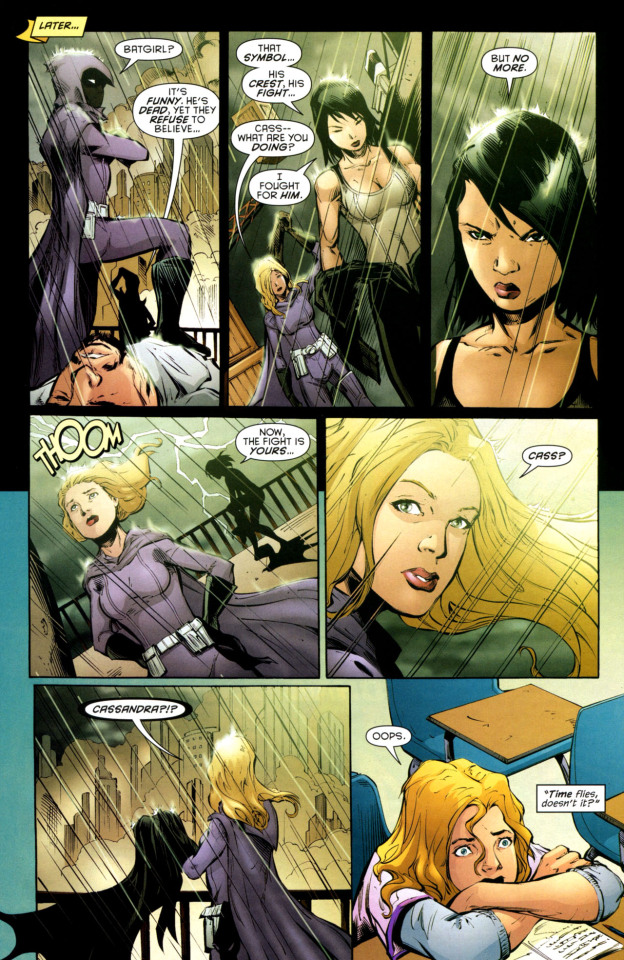
When Steph thinks about the symbolism of the Bat and of Batgirl, it's not about how it can be a symbol of hope and protection in the darkness of Gotham, it's about how it makes her feel powerful. Even when she worries about messing up it's framed as, "Nothing I do ever ends well" and "It's just a matter of time before I get caught," not concerns about the harm her previous attempts that "didn't end well" wound up doing to other people.
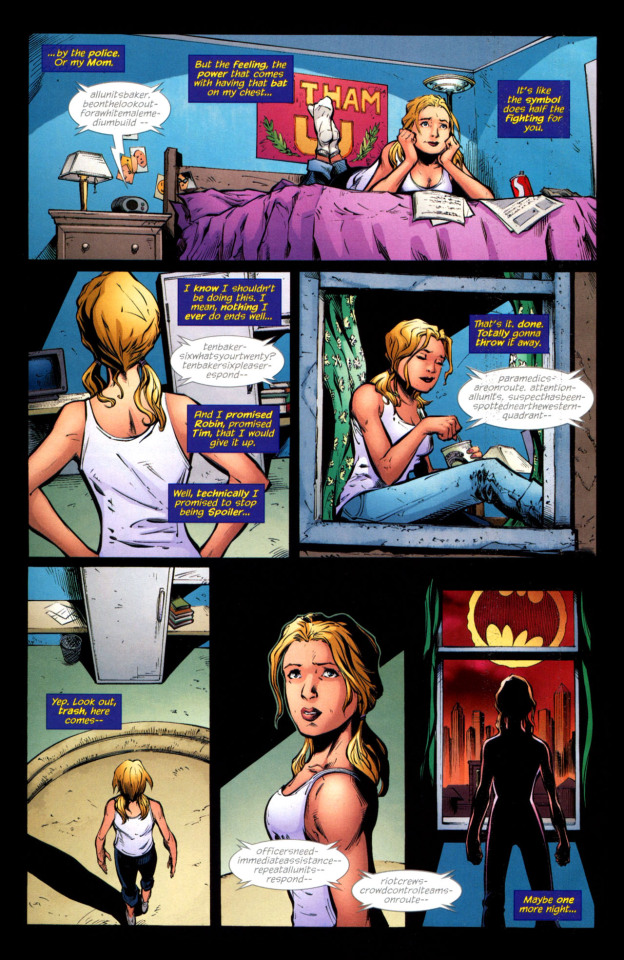
And despite the fact that there's a riot going on in the next few pages, she's not inspired to go out and help with that, but to assist a single dumbass cop who got in over his head.
And then again when Babs shows up to chew her out in the next issue, it's all about Steph and her safety. "You already died" this and "You have a death wish" that. Barbara Gordon, the original Batgirl, only gets to talk about the symbolism of Batgirl as it relates to Stephanie Brown -- "Wearing that Bat on your chest might scare off the smaller thugs, but you're literally asking, no, begging for attention from more dangerous criminals. You're a mark for anyone who wants to make theirs."
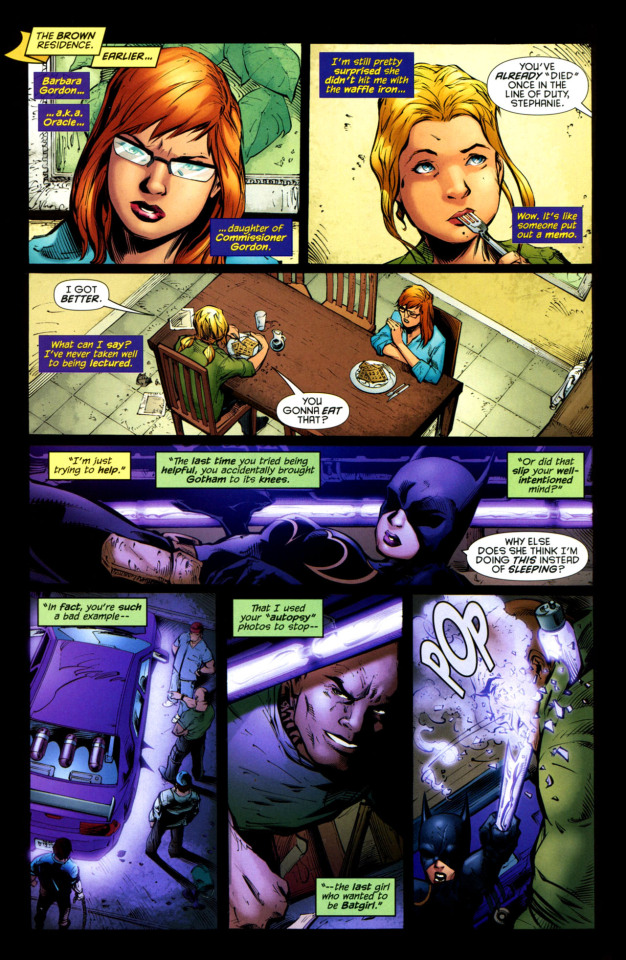
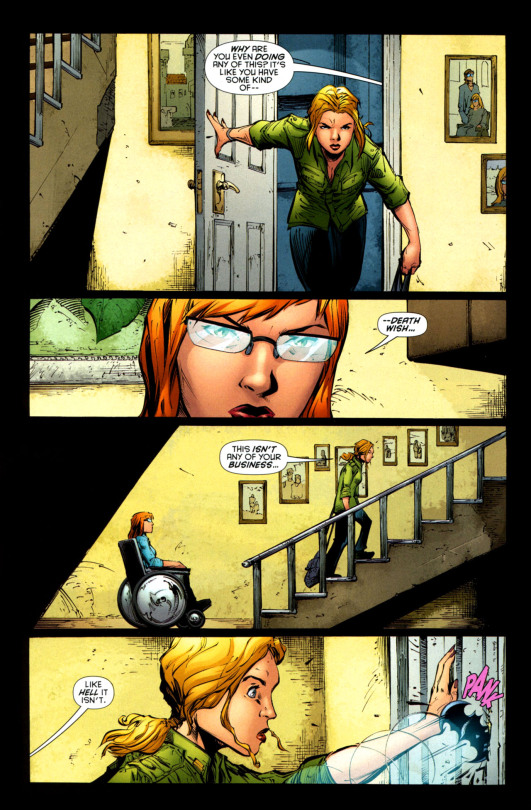

Again, even the fact that she fucked up in the past and hurt people is framed around Steph -- "The last time you tried being helpful, you accidentally brought Gotham to its knees." And while Steph pays lip service to "doing this instead of sleeping" because she "thinks it's right," she doesn't ever elaborate on what exactly is "the right thing" she thinks she's doing, and it's not like she's gone out to protect people. You can't even argue, like you maybe could with the street race, that she's doing a flashy display to show ordinary people there's someone on their side -- she's beating up random goons in an isolated chop-shop.
Then of course there's the fact that nothing about Scarecrow's whole Thrill plot makes any sense because he's not being written with any kind of coherent villain motivation, it's all just being done to set up moments for Steph. Why do some of his goons decide to spike the punch at a random college party and then run away at just the right moment to make themselves look as suspicious as possible? Because Stephanie's going to be there and they need to hook her into that plot.
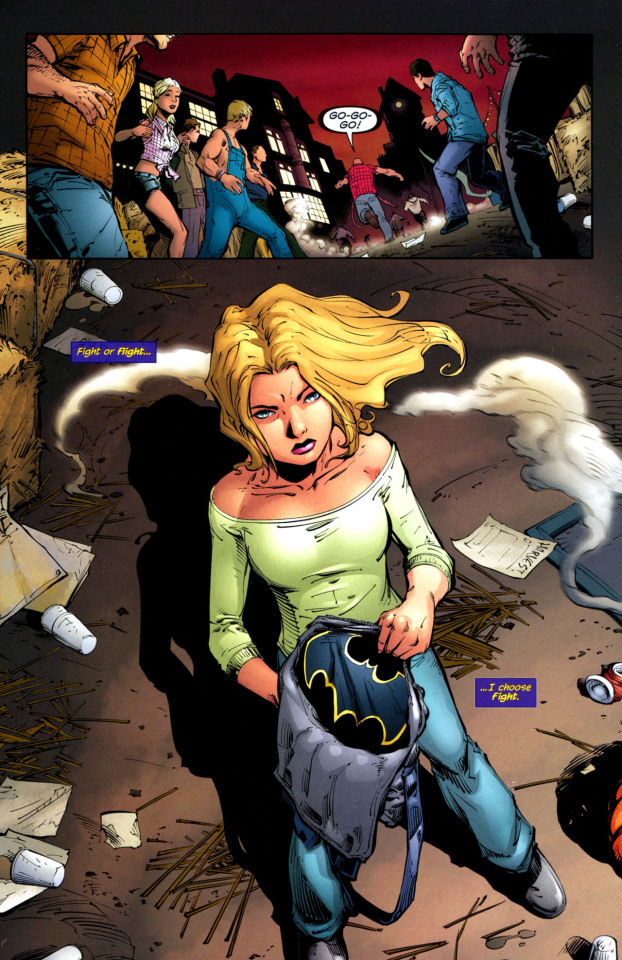
And when Steph argues with Babs later about why they should work together to solve this case, does she express concern about her classmates or her university, or even point out that Barbara isn't working with an on-the-street agent like she has in the past and hey, maybe you'd be a little less stressed if you had someone to share the load?
Nope. It's just "I'm just as much a part of it now as you are!"
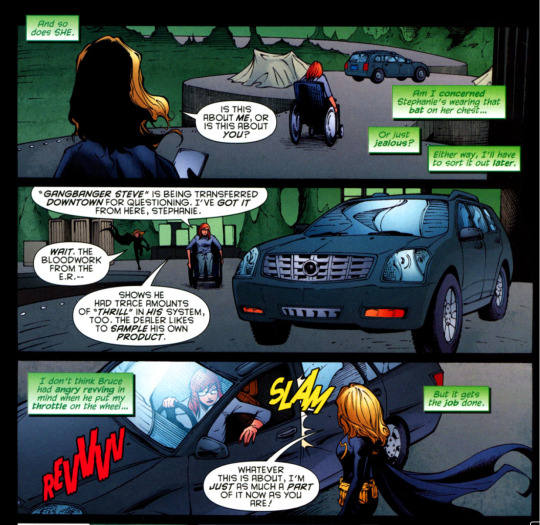
To say nothing of my eternal, teeth-grinding frustration over Barbara's characterization. "I'm only being so hard on her because I'm jealous that she's Batgirl and I'm not anymore." Fuck all the way off, Bryan Q. Miller.
This whole thing is so bad that when you get to the climax of this arc -- when they've tracked Scarecrow and his goons to their creepy hospital lair -- the stakes aren't that anyone is in danger, or that there's any chance that Scarecrow might be able to escape in the next five minutes before the police arrive. In fact, if Steph's actual motivation was to make sure Scarecrow saw justice, it would've been a better strategy for her to stay outside watching the exits so she could jump him if he tried to make a run for it.
But she doesn't do that. Because the actual stakes for the climax of the first arc are that if she doesn't swing in and beat the shit out of Scarecrow right the fuck now, the police will beat her to it and then Stephanie won't get the credit for saving the day.
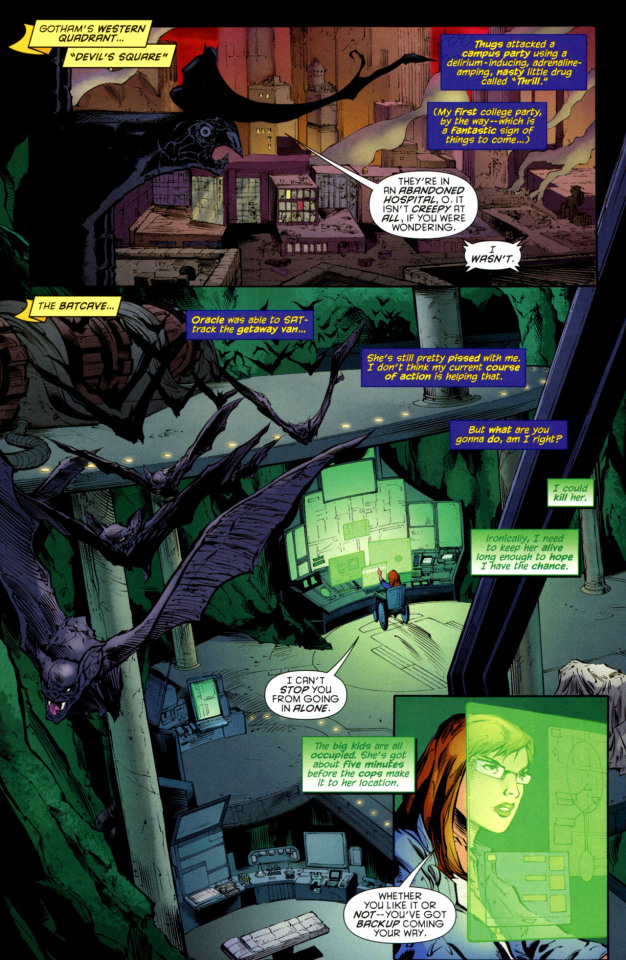
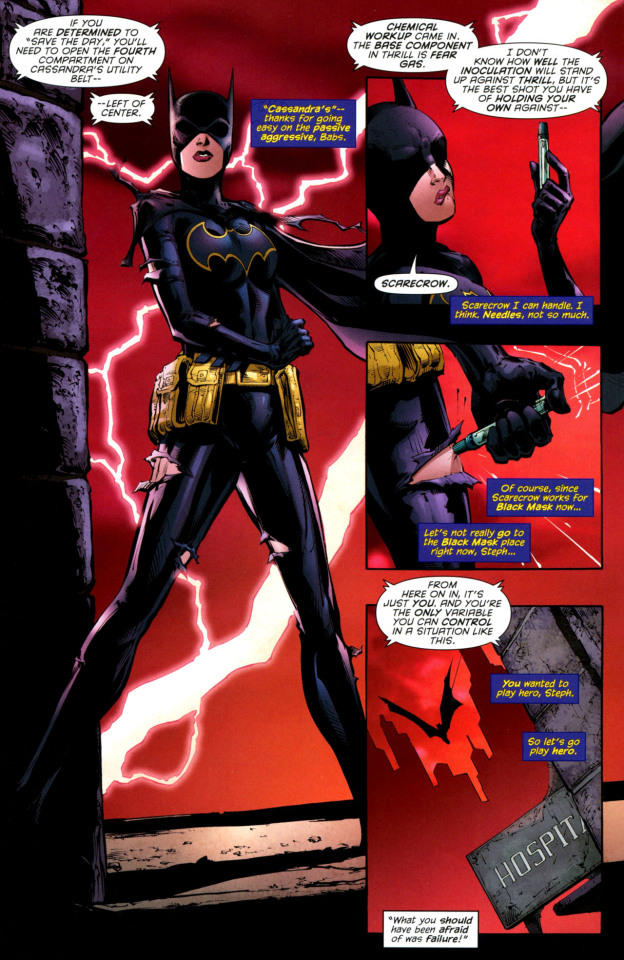
They even try to clumsily raise the stakes by implying that Scarecrow works for Black Mask, a plot point that goes absolutely nowhere because -- whoopsie -- Black Mask is dead at this point and has been since before Steph came back to life. He only ever showed up again as a Black Lantern in Blackest Night, at which point Ivy fed him to a plant.
(They did not fix this in the trade paperback version BTW, I checked)
There's some effort to turn Steph's fight with Scarecrow into something more by having him spout some weird nonsense about how he's controlling people with drugs because, "Nobody truly has a choice little girl" while she represents free will fighting back against attempts to take it away, but that's seriously hamstrung by the fact that writing is all over the place.
Like, at the start of Steph's big dramatic speech, she's all but arguing against the concept of free will, echoing an earlier classroom discussion I've bitched about before, saying that people (by which of course she actually means herself) stay when things get tough "Because we don't know how to do anything else."
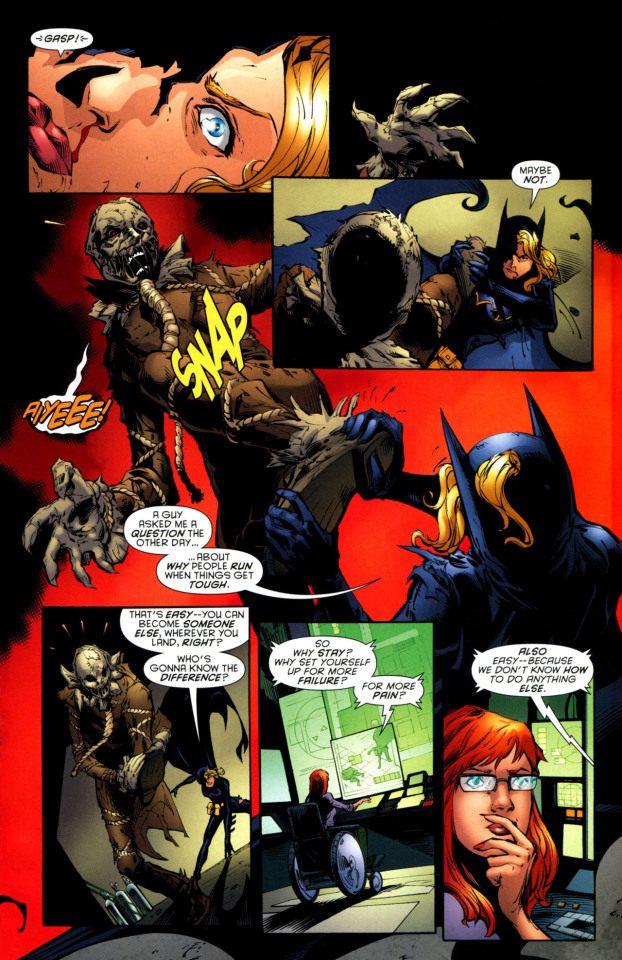
But on the very next page she poses the question again and answers it with... frankly complete nonsense.
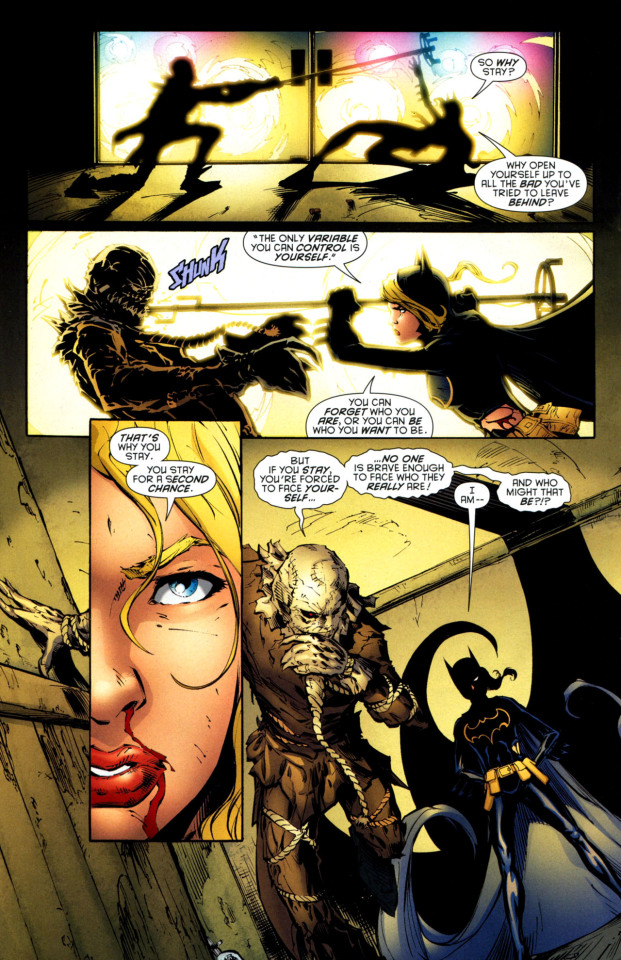
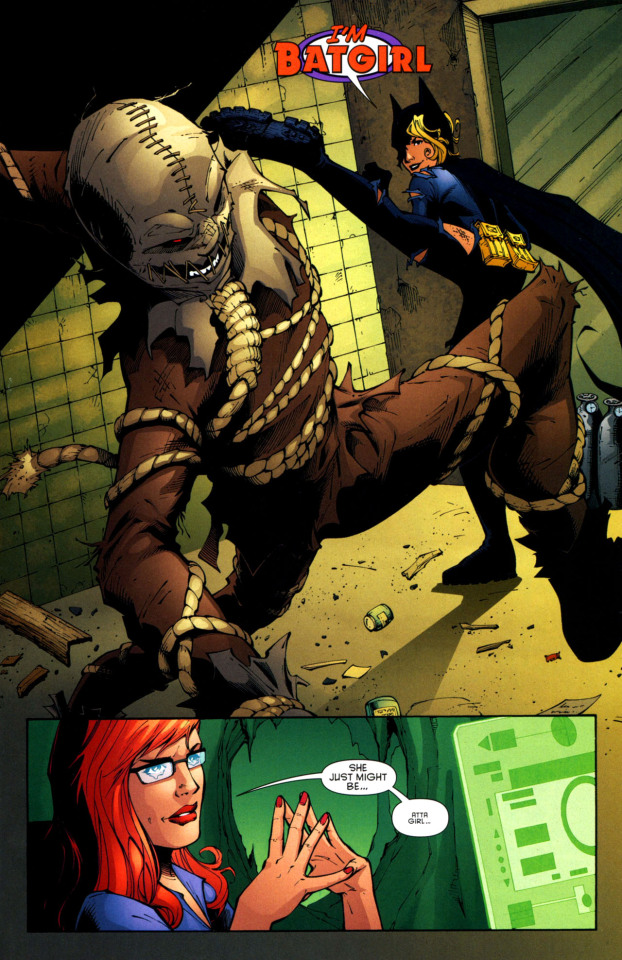
Because the point isn't actually 'control vs. free will', the whole thing -- all of the forced, misunderstood philosophy that fills out this entire arc -- is actually just repeating the same question Babs was asking earlier, this time in metaphor -- why does Stephanie keep throwing herself into danger, why doesn't she just quit?
And her answers, apparently, are, "because this is who I want to be" and "because I don't know how do anything else." Neither of which spare even a passing thought for anyone but herself, which is kind of a problem if you're trying to present Batgirl's mission statement as bringing hope to the people around her.
Then there's the bit about "facing your worst self," which refers to slightly before this, when Scarecrow drugs Steph with Thrill (a move that makes no sense in-universe because again, Scarecrow is only here to set up set pieces for Stephanie and has zero internal logic of his own). What Steph sees during that sequence is her ex-boyfriend and previous identity tearing her down and telling her that she's not good enough to be a superhero, which implies that her 'worst self' is self-doubt, or possibly "letting other people make you doubt yourself." Again -- all about her, with other people framed as nothing but obstacles to her happiness.
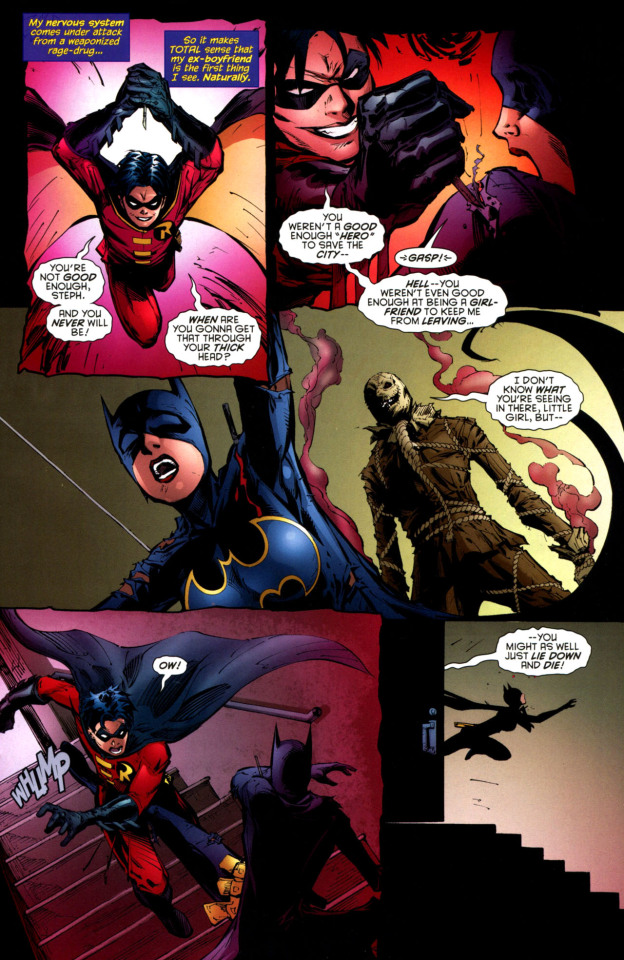
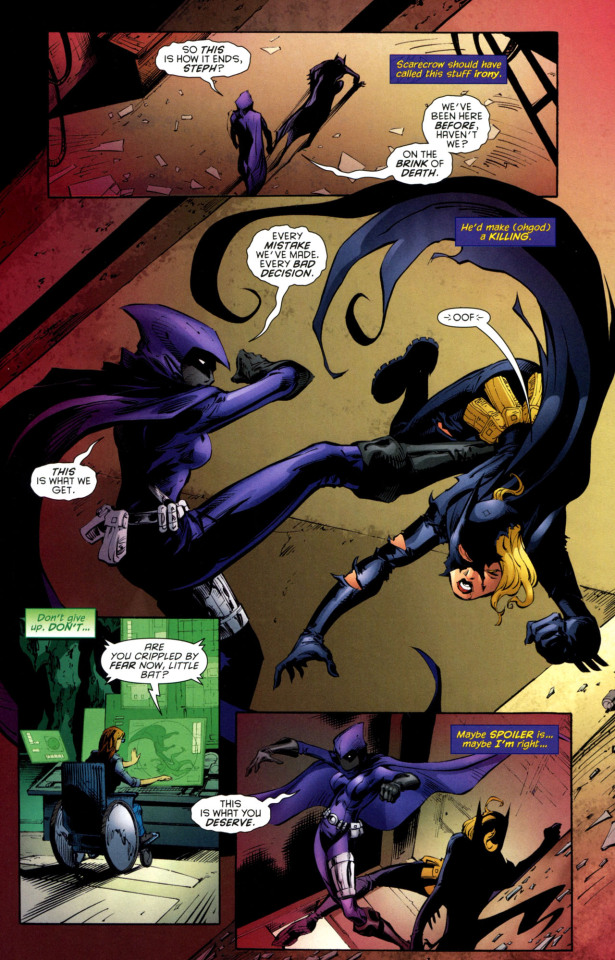
And just to remind you-- she has no actual reason to be here. She's not "saving the city," the city is not under threat. She's not doing anything heroic by throwing herself into this fight. She's only doing this because she wanted the credit for saving the day. That's the only stake the story ever establishes.
It's like there's this standing assumption that she must obviously want to be superhero for selfless reasons, therefore they don't need to bring that up ever and can just focus on how much she wants to be one and how noble it is that she's willing to fight through pain and hardship to be one.
But that's just not how it works? Maybe if you were still writing for the Golden Age when the storytelling was simpler and characterization was optional, but not in 2009. Part of the purpose of a solo book's first arc is to establish/re-establish the core hero's motivation and, if it's changed, explain how and why.
Just as a contemporary example -- Red Robin sends Tim Drake off on what's literally a personal quest and spends its first arc establishing how he's darker and more alone than he's ever been before... but it still opens with him rescuing a kidnapping victim, reaffirming that, whatever he's going through and whatever he has to do to accomplish his goal, he's still, at heart, a hero who will put his own needs aside to protect an innocent. That's also the role that Tam Fox essentially plays in the second arc, giving him someone to protect even when he's isolated from the normal push and pull of the DCU.
Whether you're approaching Batgirl (2009) as a new reader who's never met Steph before in your life, or as someone who read her previous material, there is nothing in this first arc, or those that follow, that establishes her motivation beyond, "I want to be Batgirl and I won't let anyone tell me no." She'll occasionally say she's being selfless and heroic, but it's not backed up by her actions or her thoughts.
Perhaps the most blatant self-contained example of this "It's all about Stephanie and obviously she's a perfectly selfless hero so we don't need to bother establishing it," mindset comes in the denouncement of the first arc. They recreate the vow in the dark -- not the most iconic scene in Batman history but still one that's well-known, a moment that goes all the way back to the first appearance of Robin, when Dick and Bruce vowed an "undying oath" to fight together against crime and corruption and never to swerve from the path of righteousness, symbolically committing themselves to act as a light in the darkness and protectors of the innocent.
Batgirl (2009) recreates this scene... by having Barbara vow to support Stephanie Brown and only Stephanie Brown in everything that she does "for as long as she wants it" so she "won't go out alone" and end up in a chair like Babs did. Meanwhile, Steph's response boils down to, "Oh yeah totes me too," because, according to the book, she doesn't need to take an oath, it's just completely self-evident that she's already made her right choice and will obviously continue to do the same forever and ever, no doubt about it.
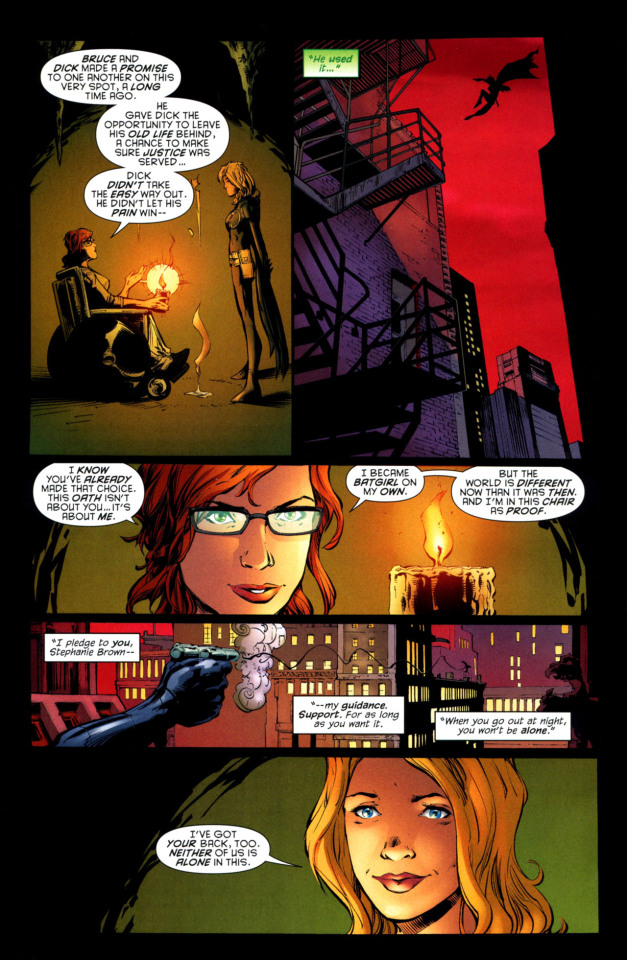
Two extra little details scattered throughout:
Through the entire series, Steph is constantly doing this obnoxious humble-brag thing of, "I'm Stephanie Brown, and I'm just a normal girl tee-hee" over images of her doing badass Batgirl things that are obviously supposed to be ironic, and she always uses her full name. The trade paperback version is literally called, "Batgirl: Stephanie Brown" because there's nothing else to say about this story. Tim Drake: Robin didn't use his full name this much and it was actually in the title.
And that's not even getting into how often they waste entire pages on splash images of just... Stephanie. Not Stephanie doing anything special, just, Stephanie, and we're supposed to be very awed and impressed by her because she's Stephanie Brown and she's Batgirl now wowie wow wow.


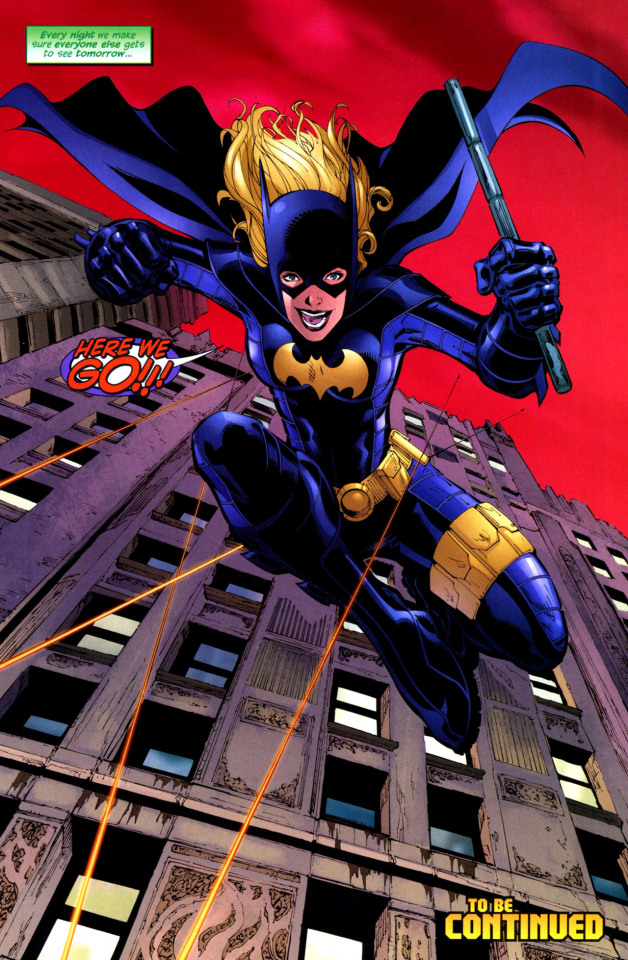
That one tiny little caption box in the upper-left corner of the last page of the storyline? That's literally the first and only time that the concept of "Batgirl makes sure everyone gets home to see tomorrow" is ever mentioned.
This his is all just the first storyline. This same pattern continues on into the rest of the book, only getting worse as they add in other Batfamily member guest-stars for Steph to show up and prove wrong, and stock civilians who do nothing but shower her with praise and adoration. The tiny little sprinkles they offer up of, "Oh yeah I'm doing this to bring hope to the people of Gotham!!" just don't compare to deluge of "Steph gets to be Batgirl because she wants to be Batgirl, that makes her the coolest motherfucker on the planet, and if you disagree you must be sexist."
---
TL;DR (and sorry this got so long) -- Bryan Q. Miller et. al seem to be either under the impression (or want to give the impression) that they're telling the story of Stephanie Brown, the plucky young girl who never gave up on her dream of being a superhero no matter the haters or setbacks she faced, and how seeing her succeed despite being so average and relatable inspires other average people to have hope and fight for a better tomorrow.
But the story they actually tell is of Stephanie Brown, a teenage girl utterly obsessed with becoming a superhero to the exclusion of all else, including her own well-being, future, and relationships with her friends and family, apparently just because she likes the way it makes her feel, has no self-control and can't imagine herself doing anything else, who is applauded and cheered for this by everyone she meets, save for a small handful of haters who are just there to be proven wrong, beaten up, or both.
The first could've been a good-ish story -- ish, because it doesn't actually engage with Steph's previous characterization, but that's a different post -- but it's just not the story they told.
#stephanie brown#batgirl#batgirl 2009#batgirls#dc comics#dc#batman#meta#comics meta#barbara gordon#cassandra cain#hmmmm I wound up spending all day on this whoops#ah well it was a sick day and I needed to get it out of my head#there are worse reasons not to move for eight hours
72 notes
·
View notes
Note
I don't think anyone making the 'it's wrong to argue the show abandoned its premise' argument has really engaged with what the problem here actually is
there's often this bad faith painting of everyone with the same brush that they're just complaining because they thought they were being promised one thing and got another and that's their only problem.
besides the fact it's not exactly wrong if you thought you were getting steak only to be disappointed when the show served up slurry instead, it's ignoring the bigger problem.
the premise of the show is supposed to drive the story and without that frame, a lot of stories lose focus. and hb is very much one of those stories. We have a story where the writers are increasingly disinterested in the emotional state of their own main character, and as far as the Stolas plotlines go...oh boy.
So Stella had moved out by Ozzie's yet we're now approaching ten episodes later and the divorce is still not finalized, who knows what's even going on with that at this point. Doubtless it will form the backbone of s3 if they make it because that and stol!tz are the only things the show has left going for it.
And that means the writers have to drag out both plotpoints as long as possible because nothing else matters at this point. If what they're going for now is drama and not comedy I would like to point out most prestige drama has multiple plotlines with its ensemble cast. HB has set up plenty of avenues for that and done nothing with most of them. They have no road that would feel natural to develop because they've left themselves no options.
Also - and it probably goes without saying but I'll say it anyway - 'will a character divorce his evil wife' and 'will that same character successfully bully his love interest into being his idea of the perfect partner' are not good driving questions for long form drama. We know Stolas is definitely going to leave Stella so there's little dramatic tension outside of her trying to get petty revenge, which is dumb since Stolas has the god powers to just body her if he wanted to. And the second one assumes the audience is invested in the will they won't they of Stol!tz - and given how unlikeable Stolas has become more fans are getting turned off from ever caring if they will (and the showrunners already spoiled the ending on that, so extra who cares?)
it's the exact same logic people use to dismiss anyone saying 'X character is badly written' when they snidely respond 'you're just sad your headcanon the show never said it was going to give didn't come true'. It's a neat little trick to avoid why critics hate how Stolas, Stella, Millie etc. are written (or underwritten)
Well said. But then, "bad faith painting" is nothing new to the crowd of people we're talking about. I think they actually know full well what the problem critics have is, but resorting to strawmen arguments is all they've got.
41 notes
·
View notes
Note
I see your point about June (and June is my favorite too). And I've definitely seen people headcanoning trans boy John out of really blatant spite, and complaining about June in a way that felt extremely pointed, like her mere existence is an insult and a source of hurt.
Buuuut on the other hand, many people loved transfem Roxy for a long time before the Epilogues, and I think it's fine and fair for them (... okay, us) to feel fleetingly disappointed that Roxy is transmasc in the Epilogues. I also think it's fine and fair to continue headcanoning Roxy as transfem, because the Epilogues were very explicitly in-text framed as one possible continuation out of many. I won't lie, I just love that t4t f/f Roxygen.
So my line of thinking is, it's probably still fine and fair to also love trans guy John, if people are inclined that way. It's more about the way that they do it? If you're finding yourself framing June as some kind of invasion on your holy safe space by the mean and terrible new writers of Homestuck, you need to take a step back and reexamine the transmisogynist bias there, and most importantly you need to stop being so goddamn rude to the people making art that just isn't for you. But on the other hand, I think simply ignoring the Epilogues and doing your own thing with trans boy John and his shaving cream trauma, that to me is perfectly in line with - and in fact respectful of - the spirit of the Epilogues.
(Similarly, I don't think it'd be bad to do a reading of the TUA comics where Vanya is a trans girl; I don't even think it'd be bad to write an AU genderswap of the TUA show universe where Viktor is a trans girl, though I'd greatly prefer if other characters' gender was changed too in that case.) (For example, I'd enjoy a full swap where A and V Hargreeves were the only "boys" growing up, and then V transitions and A is left all alone with his masculinity and he lets it steep into resentment. Also, sometimes you want trans girls with violins blowing up the world.)
Right, I hear what you’re saying but I think there’s a couple of key differences here
First of all, we know for a fact that Roxy being transmasc was prompted by a transmasc writer who was repeatedly & horribly transmisogynistic about transfem headcanons, so I don’t think it’s too much of a stretch to assume that he really did specifically hate transfem Roxy headcanons out of spite so much that he made it an impossible reading in both timelines. But even then — I do think that if somebody specifically just decided Roxy is transfem and everything else from the Epilogues is the same (or magically headcanoned away as making sense somehow) then they would be intentionally misunderstanding & rejecting the text too. Like, that’s ok, that’s literally what a large part of fandom is, but the reasons for doing this are not neutral, and they reflect hegemonies & wider values.
In the case of transfem Roxy the point is to pointedly reject something we think is transmisogynistic — we have been teased with transfem Roxy for years, it’s an obvious & clear reading of her relationship to Callie in Act 6, and so I think it’s a legitimate criticism of the Epilogues. Meanwhile, there straight has not been years of hints for transmasc John, in fact, to headcanon June as transmasc you have to pointedly ignore her already extant queer narrative.
I also think you either misunderstand or are intentionally misunderstanding how alternate realities work in The Homestuck Epilogues & Homestuck Beyond Canon. They are not just one continuation out of many — there is only the two as far as I’m aware. I’m not up to date with HSBC but it’s my understanding that reality was cleft in two.
i agree with you on the Umbrella Academy! because this is something that has been like rebooted to switch things up, those characters are gonna get remixed. i’d love to see a transfem Vanya somewhere down the line. but if i only blogged about the tv show and i was constantly & loudly explaining how i prefer transfem Vanya and how she should be transfem in the show then I think that would obviously be in poor taste.
i think what bothers me is the boldness of so many men to be like “idk i just prefer this as a man character” right in the replies of posts where transfems are gushing about/sharing their transfem headcanons. I can’t even talk about June being trans without a few people saying that, and that’s actually confirmed as 100% happening, so it’s even more impossible to escape with like transfem Link headcanons etc.
i think all in all, transmascs, trans boys & trans men should try and leave more space for their sisters in the community. it is not subversive to wish every character was a man. just misogynistic. leave room for transfems, trans girls & trans women in fandom and beyond, folks.
16 notes
·
View notes
Text
OFMD SPOILERS AHEAD
.
so i finished our flag means death a few days ago and i finally have coherent thoughts, so i’m gonna talk about izzy’s death
i’ve seen A LOT of people be extremely upset about izzy dying at the end of s2. and i get it. it hurt seeing him die. he’d finally gotten his character arc and he finally was healing and then. death. it hurt. i won’t deny that, it would be disingenuous to act like it wasn’t a painful moment.
but what i cannot get behind is the way some people are framing izzy’s death.
it’s only been a few days of me not aggressively dodging ofmd posts in an attempt to avoid spoilers and in those few days i have seen a truly staggering number of posts framing izzy’s death as being “burying your gays” and that his death is somehow indicative of ulterior motives from the showrunners and writers.
which is just— for the love of all that is holy please use your critical thinking skills. do you not realize how much those claims SCREAM “media illiteracy”?
Bury Your Gays as a trope necessitates a few things. firstly, it’s typically done to further someone else’s story line and secondly, it’s done in stories where there is only one or maybe two queer characters. the writer is burying their one gay, typically for the sake of advancing a straight character’s arc.
that’s not what’s happening with izzy’s death. ofmd is a show that is almost entirely made up of characters who are some flavor of queer. it’s not Bury Your Gays for one of the many gays to die. it’s just character death. which yes, is painful and heartwrenching and heartbreaking. but it’s not inherently homophobic to kill a queer character in media. and izzy’s death doesn’t serve to further anyone else’s character development. people have said it’s just there to like “make sure the writer’s otp end up together” or something like that. which is just such a weird take. first of all the writer’s otp are literally the main characters of this show. and secondly, izzy’s death felt very much like a moment for he and ed to get closure. it had nothing to do with stede, really.
you’re allowed to feel hurt by izzy’s death. in fact, it’s perfectly normal to feel hurt and upset and sad when a character you love dies.
but you can’t start throwing around false and harmful accusations about the writers because the death upset you.
something isn’t objectively bad or “problematic” because YOU didn’t like it. ofmd isn’t homophobic because a queer character that you personally liked died.
and acting like queer people can’t die in media without it being “homophobic” just serves to further other us.
and throwing around accusations that it homophobic is so flippantly is honestly just disappointing.
36 notes
·
View notes